
 Better Living Through Economics
by
From the late fifteenth to the eighteenth centuries, the imagination came to be recognized in South Indian culture as the defining feature of human beings. Shulman elucidates the distinctiveness of South Indian theories of the imagination and shows how they differ radically from Western notions of reality and models of the mind.
Better Living Through Economics
by
From the late fifteenth to the eighteenth centuries, the imagination came to be recognized in South Indian culture as the defining feature of human beings. Shulman elucidates the distinctiveness of South Indian theories of the imagination and shows how they differ radically from Western notions of reality and models of the mind.
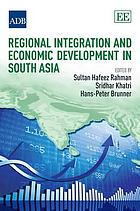 Regional Integration and Economic Development in South Asia
by
This book considers the leadership of the South Asian Association for Regional Cooperation (SAARC) and the interaction with civil society in the process of South Asian regional cooperation and integration, and discusses how the emerging urgency in the pro
Regional Integration and Economic Development in South Asia
by
This book considers the leadership of the South Asian Association for Regional Cooperation (SAARC) and the interaction with civil society in the process of South Asian regional cooperation and integration, and discusses how the emerging urgency in the pro
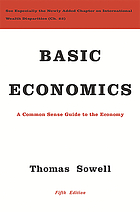 Basic Economics: a common sense guide to the economy
by
The bestselling citizen's guide to economics Basic Economics is a citizen's guide to economics, written for those who want to understand how the economy works but have no interest in jargon or equations. Bestselling economist Thomas Sowell explains the general principles underlying different economic systems: capitalist, socialist, feudal, and so on. In readable language, he shows how to critique economic policies in terms of the incentives they create, rather than the goals they proclaim. With clear explanations of the entire field, from rent control and the rise and fall of businesses to the international balance of payments, this is the first book for anyone who wishes to understand how the economy functions. This fifth edition includes a new chapter explaining the reasons for large differences of wealth and income between nations. Drawing on lively examples from around the world and from centuries of history, Sowell explains basic economic principles for the general public in plain English.
Basic Economics: a common sense guide to the economy
by
The bestselling citizen's guide to economics Basic Economics is a citizen's guide to economics, written for those who want to understand how the economy works but have no interest in jargon or equations. Bestselling economist Thomas Sowell explains the general principles underlying different economic systems: capitalist, socialist, feudal, and so on. In readable language, he shows how to critique economic policies in terms of the incentives they create, rather than the goals they proclaim. With clear explanations of the entire field, from rent control and the rise and fall of businesses to the international balance of payments, this is the first book for anyone who wishes to understand how the economy functions. This fifth edition includes a new chapter explaining the reasons for large differences of wealth and income between nations. Drawing on lively examples from around the world and from centuries of history, Sowell explains basic economic principles for the general public in plain English.
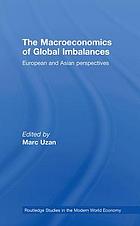 The Macroeconomics of Global Imbalances: European and Asian perspectives
by
This book is the result of a workshop on the effects of globalization on Asian and European countries, organized by Marc Uzan and the Austrian Ministry of Finance in April 2006. Bringing together key academics, policy makers and private market participants, these chapters cover the current debate of global imbalances and the way to resolve the disequilibrium in the international monetary system and understand the need for international cooperation among the different monetary areas of the world. Various important points come out of the book; firstly there is an emphasis on the difficulties for Europeans and Asians to find common positions vis-à-vis global imbalances due to different exchange rate regimes throughout Asia preventing similar responses. The role of the US dollar as a world currency is also discussed, as well as EU regional monetary cooperation and an analysis of the Euro. The implementation of economic policy to redress global imbalances is also considered, as is the emergence of China on the world stage and its industrial development projects. These questions and the way the international financial community will resolve them, will have a huge impact in the functioning of the international monetary system. The current unwinding of the global imbalances that we are facing with the global market disruptions since August 2007, demonstrate that a new geography of international finance is emerging between Europe and Asia. The book addresses also the way that a dialog in the field in monetary arena needs to be structured between Europe and Asia.
The Macroeconomics of Global Imbalances: European and Asian perspectives
by
This book is the result of a workshop on the effects of globalization on Asian and European countries, organized by Marc Uzan and the Austrian Ministry of Finance in April 2006. Bringing together key academics, policy makers and private market participants, these chapters cover the current debate of global imbalances and the way to resolve the disequilibrium in the international monetary system and understand the need for international cooperation among the different monetary areas of the world. Various important points come out of the book; firstly there is an emphasis on the difficulties for Europeans and Asians to find common positions vis-à-vis global imbalances due to different exchange rate regimes throughout Asia preventing similar responses. The role of the US dollar as a world currency is also discussed, as well as EU regional monetary cooperation and an analysis of the Euro. The implementation of economic policy to redress global imbalances is also considered, as is the emergence of China on the world stage and its industrial development projects. These questions and the way the international financial community will resolve them, will have a huge impact in the functioning of the international monetary system. The current unwinding of the global imbalances that we are facing with the global market disruptions since August 2007, demonstrate that a new geography of international finance is emerging between Europe and Asia. The book addresses also the way that a dialog in the field in monetary arena needs to be structured between Europe and Asia.
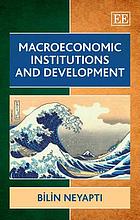 Macroeconomic Institutions and Development
by
The book incorporates the essential elements of institutional theory and highlights the issues pertaining to the measurement of institutional characteristics and the empirical analyses involving such measurement. It provides the theoretical framework of a
Macroeconomic Institutions and Development
by
The book incorporates the essential elements of institutional theory and highlights the issues pertaining to the measurement of institutional characteristics and the empirical analyses involving such measurement. It provides the theoretical framework of a
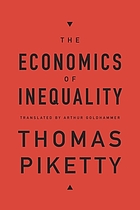 The Economics of Inequality
by
Succinct, accessible, and authoritative, Thomas Piketty's The Economics of Inequality is the ideal place to start for those who want to understand the fundamental issues at the heart of one the most pressing concerns in contemporary economics and politics. This work now appears in English for the first time.
The Economics of Inequality
by
Succinct, accessible, and authoritative, Thomas Piketty's The Economics of Inequality is the ideal place to start for those who want to understand the fundamental issues at the heart of one the most pressing concerns in contemporary economics and politics. This work now appears in English for the first time.
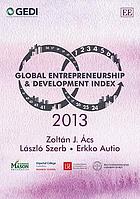 Global Entrepreneurship and Development Index 2013
by
The Global Entrepreneurship and Development Index both captures the context features of entrepreneurship and fills a gap in the measurement of development. Building on recent advances in entrepreneurship and economic development, the authors have created
Global Entrepreneurship and Development Index 2013
by
The Global Entrepreneurship and Development Index both captures the context features of entrepreneurship and fills a gap in the measurement of development. Building on recent advances in entrepreneurship and economic development, the authors have created
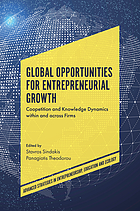 Global Opportunities for Entrepreneuri: coopetition and knowledge dynamics within and across firmsal Growth
by
Contemporary markets are increasingly complex and dynamic. Diverse business contexts have become closer, and are increasingly influenced by socio-economic and technological factors. Firms nowadays build alliances even with competing players to ensure entrepreneurial survival and growth. This publication aims to investigate, compare, and contrast the theoretical and practical elements of business concepts and models that are acclimated to the dynamic changes of our modern era. Furthermore, it describes and analyzes the current cooperative interactions among firms, and evaluates the contribution of knowledge dynamics in coopetition. Organizational performance is one of the major elements required in contemporary markets, and the necessity to promote initiatives for innovation in new technological investments creates the foundations for growth, enabling businesses to explore opportunities in the global context. This book aims to explore and utilize the existing academic knowledge, and to contribute to the topic of coopetition within and across firms for entrepreneurial growth. It is a culmination of recent global circumstances and credible academic theories, focusing on analyzing, evaluating and interpreting the modern status-quo in the international business environment.
Global Opportunities for Entrepreneuri: coopetition and knowledge dynamics within and across firmsal Growth
by
Contemporary markets are increasingly complex and dynamic. Diverse business contexts have become closer, and are increasingly influenced by socio-economic and technological factors. Firms nowadays build alliances even with competing players to ensure entrepreneurial survival and growth. This publication aims to investigate, compare, and contrast the theoretical and practical elements of business concepts and models that are acclimated to the dynamic changes of our modern era. Furthermore, it describes and analyzes the current cooperative interactions among firms, and evaluates the contribution of knowledge dynamics in coopetition. Organizational performance is one of the major elements required in contemporary markets, and the necessity to promote initiatives for innovation in new technological investments creates the foundations for growth, enabling businesses to explore opportunities in the global context. This book aims to explore and utilize the existing academic knowledge, and to contribute to the topic of coopetition within and across firms for entrepreneurial growth. It is a culmination of recent global circumstances and credible academic theories, focusing on analyzing, evaluating and interpreting the modern status-quo in the international business environment.
 Entrepreneurship Education : new perspectives on entrepreneurship education
by
Universities globally are under pressure from an expanding range of stakeholders to provide enterprise education and support to students. Enterprise education had become a research domain in itself and an increasingly important aspect of UK universities' curricular. Within the UK, policymakers consider enterprise education, and the skills it develops, as increasing student's employability skills, regardless of what their primary subject of study is, and thereby assisting them in gaining employment upon. Despite this growth, there is ongoing debate regarding the effectiveness of entrepreneurship education and there are calls for further evidence to validate its impact. This book meets that call in providing further evidence for best practice and successful deployment. Authors provide evidence to inform the entrepreneurial education discipline in terms of best practice, success stories and identify its future direction for key stakeholders. The book concludes with a summary from the authors which will analyse and contrast the emergent themes identified in each chapter.
Entrepreneurship Education : new perspectives on entrepreneurship education
by
Universities globally are under pressure from an expanding range of stakeholders to provide enterprise education and support to students. Enterprise education had become a research domain in itself and an increasingly important aspect of UK universities' curricular. Within the UK, policymakers consider enterprise education, and the skills it develops, as increasing student's employability skills, regardless of what their primary subject of study is, and thereby assisting them in gaining employment upon. Despite this growth, there is ongoing debate regarding the effectiveness of entrepreneurship education and there are calls for further evidence to validate its impact. This book meets that call in providing further evidence for best practice and successful deployment. Authors provide evidence to inform the entrepreneurial education discipline in terms of best practice, success stories and identify its future direction for key stakeholders. The book concludes with a summary from the authors which will analyse and contrast the emergent themes identified in each chapter.
 The Great Debates in Entrepreneurship
by
This volume presents some of the most important 'debates' that exist in the field of Entrepreneurship today. It brings together leading scholars, deriving contributions from special sessions designed by the Global Consortium of EntrepreneurshipCenters (GCEC) to discuss both sides of these 'great debates'. Topics include: "Is the Business Plan ReallyDead and Should It Be," "Does the LeanStart up Deserve all the Hype?""Entrepreneurial Ecosystem - Weak Metaphor orGenuine Concept?" "Teaching vs. Doing - Is there a Role for Lecture and Contentin Entrepreneurship Education?" "Should Centers Be Controlled Centrally?" and "Is a Bachelor's Degree inEntrepreneurship Worth It?".
The Great Debates in Entrepreneurship
by
This volume presents some of the most important 'debates' that exist in the field of Entrepreneurship today. It brings together leading scholars, deriving contributions from special sessions designed by the Global Consortium of EntrepreneurshipCenters (GCEC) to discuss both sides of these 'great debates'. Topics include: "Is the Business Plan ReallyDead and Should It Be," "Does the LeanStart up Deserve all the Hype?""Entrepreneurial Ecosystem - Weak Metaphor orGenuine Concept?" "Teaching vs. Doing - Is there a Role for Lecture and Contentin Entrepreneurship Education?" "Should Centers Be Controlled Centrally?" and "Is a Bachelor's Degree inEntrepreneurship Worth It?".
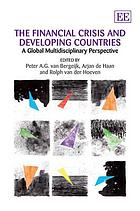 The Financial Crisis and Developing Countries: a global multidisciplinary perspective
by
The Financial Crisis and Developing Countries discusses and analyses regional and country specific impacts of the financial crisis in emerging markets and developing countries, covering all continents. Using heterodox and mainstream methodologies, the boo
The Financial Crisis and Developing Countries: a global multidisciplinary perspective
by
The Financial Crisis and Developing Countries discusses and analyses regional and country specific impacts of the financial crisis in emerging markets and developing countries, covering all continents. Using heterodox and mainstream methodologies, the boo
 Economic Crisis Management: policy, practice, outcomes, and prospects
by
Economic Crisis Management discusses contemporary and economic policy and its application to major crisis economies in Asia. The book contains a collection of studies by international experts in economics and finance with special focus on major aspects of
Economic Crisis Management: policy, practice, outcomes, and prospects
by
Economic Crisis Management discusses contemporary and economic policy and its application to major crisis economies in Asia. The book contains a collection of studies by international experts in economics and finance with special focus on major aspects of
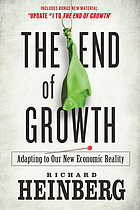 The End of Growth
by
Economics has failed us ... but there is life after growth! Economists insist that recovery is at hand, yet unemployment remains high, real estate values continue to sink, and governments stagger under record deficits. The End of Growthproposes a startling diagnosis: humanity has reached a fundamental turning point in its economic history. The expansionary trajectory of industrial civilization is colliding with non-negotiable natural limits. Richard Heinberg's latest landmark work goes to the heart of the ongoing financial crisis, explaining how and why it occurred, and what we must do to avert the worst potential outcomes. Written in an engaging, highly readable style, it shows why growth is being blocked by three factors: Resource depletion Environmental impacts Crushing levels of debt These converging limits will force us to re-evaluate cherished economic theories and to reinvent money and commerce. The End of Growth describes what policy makers, communities, and families can do to build a new economy that operates within Earth's budget of energy and resources. We can thrive during the transition if we set goals that promote human and environmental well-being, rather than continuing to pursue the now-unattainable prize of ever-expanding GDP. Richard Heinberg is the author of nine previous books, including The Party's Over, Peak Everything, and Blackout. A senior fellow of the Post Carbon Institute, Heinberg is one of the world's foremost peak oil educators and an effective communicator of the urgent need to transition away from fossil fuels.
The End of Growth
by
Economics has failed us ... but there is life after growth! Economists insist that recovery is at hand, yet unemployment remains high, real estate values continue to sink, and governments stagger under record deficits. The End of Growthproposes a startling diagnosis: humanity has reached a fundamental turning point in its economic history. The expansionary trajectory of industrial civilization is colliding with non-negotiable natural limits. Richard Heinberg's latest landmark work goes to the heart of the ongoing financial crisis, explaining how and why it occurred, and what we must do to avert the worst potential outcomes. Written in an engaging, highly readable style, it shows why growth is being blocked by three factors: Resource depletion Environmental impacts Crushing levels of debt These converging limits will force us to re-evaluate cherished economic theories and to reinvent money and commerce. The End of Growth describes what policy makers, communities, and families can do to build a new economy that operates within Earth's budget of energy and resources. We can thrive during the transition if we set goals that promote human and environmental well-being, rather than continuing to pursue the now-unattainable prize of ever-expanding GDP. Richard Heinberg is the author of nine previous books, including The Party's Over, Peak Everything, and Blackout. A senior fellow of the Post Carbon Institute, Heinberg is one of the world's foremost peak oil educators and an effective communicator of the urgent need to transition away from fossil fuels.
 Institutions, Economic Performance and the Visible Hand: theory and evidence
by
The book challenges the conventional wisdom on the determinants of economic performance and provides an alternative vision of the functioning of an economic system. The author provides a structured survey which critically evaluates the theory and evidence
Institutions, Economic Performance and the Visible Hand: theory and evidence
by
The book challenges the conventional wisdom on the determinants of economic performance and provides an alternative vision of the functioning of an economic system. The author provides a structured survey which critically evaluates the theory and evidence
 Doing Good or Doing Better: development policies in a globalizing world
by
Development policies in the globalising world
Doing Good or Doing Better: development policies in a globalizing world
by
Development policies in the globalising world
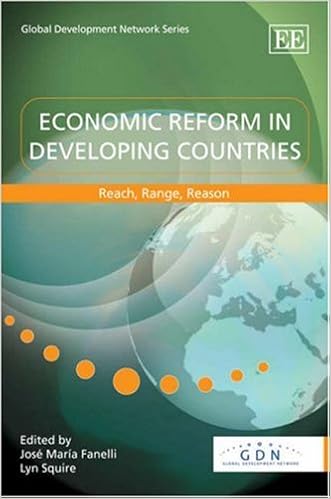 Economic Reform in Developing Countries: reach, range, reason
by
This book offers insights into the process of economic reform in developing countries. It is organized around three factors that are critical to the success of any reform. According to Nobel Laureate Amartya Sen, these key dimensions are Reach, Range, and
Economic Reform in Developing Countries: reach, range, reason
by
This book offers insights into the process of economic reform in developing countries. It is organized around three factors that are critical to the success of any reform. According to Nobel Laureate Amartya Sen, these key dimensions are Reach, Range, and
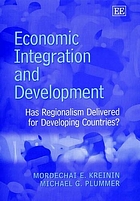 Economic Integration and Development: has regionalism delivered for developing countries?
by
Mordechai Kreinin and Michael Plummer consider the implications of the emerging global trend of economic regionalism for developing countries. The analysis focuses on the trade and investment effects of integration in developed countries on developing cou
Economic Integration and Development: has regionalism delivered for developing countries?
by
Mordechai Kreinin and Michael Plummer consider the implications of the emerging global trend of economic regionalism for developing countries. The analysis focuses on the trade and investment effects of integration in developed countries on developing cou
 Catch Up: developing countries in the world economy
by
Catch Up analyzes the evolution of developing countries in the world economy from a long-term historical perspective, from the onset of the second millennium but with a focus on the second half of the twentieth century and the first decade of the twenty-first century. It is perhaps among the first to address this theme on such a wide canvas that spans both time and space. In doing so, it highlights the dominance of what are now developing countries and ittraces their decline and fall from 1820 to 1950. The six decades since 1950 have witnessed an increase in the share of developing countries not only in world population and world income, but also in international trade, international investment, industrial production, and manufactured exports which gatheredmomentum after 1980. This book explores the factors underlying this fall and rise, to discuss the on-going catch up in the world economy driven by industrialization and economic growth. Their impressive performance, disaggregated analysis shows, is characterized by uneven development. There is an exclusion of countries and people from the process. The catch up is concentrated in a few countries. Growth has often not been transformed into meaningful development that improves the wellbeing ofpeople. Yet, the beginnings of a shift in the balance of power in the world economy are discernible. But developing countries can sustain this rise only if they can transform themselves into inclusive societies where economic growth, human development, and social progress move in tandem. Their pastcould then be a pointer to their future.
Catch Up: developing countries in the world economy
by
Catch Up analyzes the evolution of developing countries in the world economy from a long-term historical perspective, from the onset of the second millennium but with a focus on the second half of the twentieth century and the first decade of the twenty-first century. It is perhaps among the first to address this theme on such a wide canvas that spans both time and space. In doing so, it highlights the dominance of what are now developing countries and ittraces their decline and fall from 1820 to 1950. The six decades since 1950 have witnessed an increase in the share of developing countries not only in world population and world income, but also in international trade, international investment, industrial production, and manufactured exports which gatheredmomentum after 1980. This book explores the factors underlying this fall and rise, to discuss the on-going catch up in the world economy driven by industrialization and economic growth. Their impressive performance, disaggregated analysis shows, is characterized by uneven development. There is an exclusion of countries and people from the process. The catch up is concentrated in a few countries. Growth has often not been transformed into meaningful development that improves the wellbeing ofpeople. Yet, the beginnings of a shift in the balance of power in the world economy are discernible. But developing countries can sustain this rise only if they can transform themselves into inclusive societies where economic growth, human development, and social progress move in tandem. Their pastcould then be a pointer to their future.
 The changing wealth of nations 2018 : building a sustainable future
by
The changing wealth of nations 2018 : building a sustainable future
by
 The Rise of the BRICS in the Global Political Economy
by
Taking an interdisciplinary approach, Vai Io Lo and Mary Hiscock, together with scholars and researchers from around the world, investigate the rise of the BRICS and assess the extent of their further development and influence from the perspectives of economics, international relations and law.Brazil, Russia, India, and China are expected to become the world's most influential economies, surpassing the current richest economies, by the middle of the 21st century. With the inclusion of South Africa in 2010, the BRICS span across four continents, creating an abundance of geopolitical clout, in addition to their potential economic dominance. This book examines the economic developments of individual BRICS countries, the current politico-economic condition of the BRICS vis-à-vis non-BRICS countries or groups, and the potential of the BRICS to bring about changing paradigms in the global political economy.This book is an essential resource for academics, researchers and students who are interested in the rise, development and impact of the BRICS economies. It will also be of interest to economists, political scientists, and specialists in international trade and investment.
The Rise of the BRICS in the Global Political Economy
by
Taking an interdisciplinary approach, Vai Io Lo and Mary Hiscock, together with scholars and researchers from around the world, investigate the rise of the BRICS and assess the extent of their further development and influence from the perspectives of economics, international relations and law.Brazil, Russia, India, and China are expected to become the world's most influential economies, surpassing the current richest economies, by the middle of the 21st century. With the inclusion of South Africa in 2010, the BRICS span across four continents, creating an abundance of geopolitical clout, in addition to their potential economic dominance. This book examines the economic developments of individual BRICS countries, the current politico-economic condition of the BRICS vis-à-vis non-BRICS countries or groups, and the potential of the BRICS to bring about changing paradigms in the global political economy.This book is an essential resource for academics, researchers and students who are interested in the rise, development and impact of the BRICS economies. It will also be of interest to economists, political scientists, and specialists in international trade and investment.
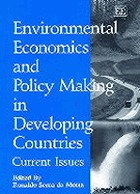 Environmental Economics and Policy Making in Developing Countries: current issues
by
The authors provide a comprehensive analysis of topics varying from the general problems of growth and conservation to specific applications such as; pollution costs, environmental taxation, deforestation and climate change. This volume also offers policy
Environmental Economics and Policy Making in Developing Countries: current issues
by
The authors provide a comprehensive analysis of topics varying from the general problems of growth and conservation to specific applications such as; pollution costs, environmental taxation, deforestation and climate change. This volume also offers policy
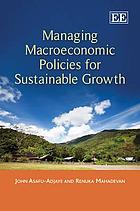 Managing Macroeconomic Policies for Sustainable Growth
by
The authors expertly reveal a model-based analysis of economic development and environmental issues with policy prescriptions for enhancing sustainable development.Within the last four decades, there has been a rapid deterioration in the quality of our
Managing Macroeconomic Policies for Sustainable Growth
by
The authors expertly reveal a model-based analysis of economic development and environmental issues with policy prescriptions for enhancing sustainable development.Within the last four decades, there has been a rapid deterioration in the quality of our
 The Political Economy of Sustainable Developmentv
by
Since the Rio 'Earth' Summit of 1992, sustainable development has become the major policy response to tackling global environmental degradation, from climate change to loss of biodiversity and deforestation. Market instruments such as emissions trading, p
The Political Economy of Sustainable Developmentv
by
Since the Rio 'Earth' Summit of 1992, sustainable development has become the major policy response to tackling global environmental degradation, from climate change to loss of biodiversity and deforestation. Market instruments such as emissions trading, p
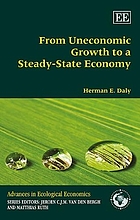 From Uneconomic Growth to a Steady-State Economy
by
In this important book, Herman E. Daly lays bare the weaknesses of growth economics and explains why, in contrast, a steady-state economy is both necessary and desirable. Through the course of the book, Daly develops the basic concept and theory of a steady-state economy from the 1970s limits to growth debates. In doing so, he draws on work from the classical economists, through both conflicts and agreements with neo-classical and Keynesian economists, as well as recent debates on uneconomic growth.
From Uneconomic Growth to a Steady-State Economy
by
In this important book, Herman E. Daly lays bare the weaknesses of growth economics and explains why, in contrast, a steady-state economy is both necessary and desirable. Through the course of the book, Daly develops the basic concept and theory of a steady-state economy from the 1970s limits to growth debates. In doing so, he draws on work from the classical economists, through both conflicts and agreements with neo-classical and Keynesian economists, as well as recent debates on uneconomic growth.
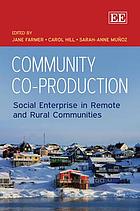 Community Co-Production: social enterprise in remote and rural communities
by
This book addresses a clutch of contemporary societal challenges including: aging demography and the consequent need for extended care in communities; public service provision in an era of retrenching welfare and global financial crises; service provision
Community Co-Production: social enterprise in remote and rural communities
by
This book addresses a clutch of contemporary societal challenges including: aging demography and the consequent need for extended care in communities; public service provision in an era of retrenching welfare and global financial crises; service provision
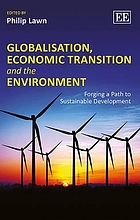 Globalisation, Economic Transition and the: forging a path to sustainable development Environment
by
This book focuses on three critical issues pertaining to the broader goal of sustainable development Ð namely, the degenerative forces of globalisation, ecological sustainability requirements, and how best to negotiate the economic transition process.
Globalisation, Economic Transition and the: forging a path to sustainable development Environment
by
This book focuses on three critical issues pertaining to the broader goal of sustainable development Ð namely, the degenerative forces of globalisation, ecological sustainability requirements, and how best to negotiate the economic transition process.
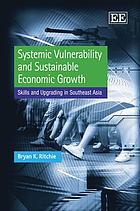 Systemic Vulnerability and Sustainable Economic Growth: skills and upgrading in Southeast Asia
by
For many developing countries, economic growth is an elusive quest. Both economists and policymakers have long known that issues such as education, investment and infrastructure are necessary ingredients for development and yet only a very small number of
Systemic Vulnerability and Sustainable Economic Growth: skills and upgrading in Southeast Asia
by
For many developing countries, economic growth is an elusive quest. Both economists and policymakers have long known that issues such as education, investment and infrastructure are necessary ingredients for development and yet only a very small number of
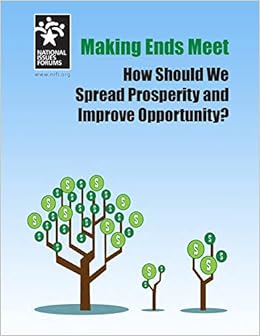 Making Ends Meet: How Should We Spread Prosperity and Improve Opportunity.
by
For many Americans, the recovery from the 2007 recession, a recovery that officially began in 2009, feels very remote, or nonexistent. Even as the stock market surges and millions of jobs have been created, they see a very different picture. Many Americans still believe in the basic notion that anyone who works hard should be able to support a family and get ahead. What can we do to make that happen?
Making Ends Meet: How Should We Spread Prosperity and Improve Opportunity.
by
For many Americans, the recovery from the 2007 recession, a recovery that officially began in 2009, feels very remote, or nonexistent. Even as the stock market surges and millions of jobs have been created, they see a very different picture. Many Americans still believe in the basic notion that anyone who works hard should be able to support a family and get ahead. What can we do to make that happen?
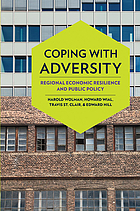 Coping with Adversity: regional economic resilience and public policy
by
Coping with Adversity addresses the question of why some metropolitan-area regional economies are resilient in the face of economic shocks and chronic distress while others are not. It is particularly concerned with what public policies make a difference in whether a region is resilient. The authors employ a wide range of techniques to examine the experience of all metropolitan area economies from 1978-2014. They then look closely at six American metropolitan areas to determine what strategies were employed, which of these contributed to regional economic resilience, and which did not. Charlotte, North Carolina, Seattle, Washington, and Grand Forks, North Dakota, are cases of economic resilience, while Cleveland, Ohio, Hartford, Connecticut, and Detroit, Michigan, are cases of economic nonresilience. The six case studies include hard data on employment, production, and demographics, as well as material on public policies and actions. The authors conclude that there is little that can done in the short term to counter economic shocks; most regions simply rebound naturally after a relatively short period of time. However, they do find that many regions have successfully emerged from periods of prolonged economic distress and that there are policies that can be applied to help them do so. Coping with Adversity will be important reading for all those concerned with local and regional economic development, including public officials, urban planners, and economic developers.
Coping with Adversity: regional economic resilience and public policy
by
Coping with Adversity addresses the question of why some metropolitan-area regional economies are resilient in the face of economic shocks and chronic distress while others are not. It is particularly concerned with what public policies make a difference in whether a region is resilient. The authors employ a wide range of techniques to examine the experience of all metropolitan area economies from 1978-2014. They then look closely at six American metropolitan areas to determine what strategies were employed, which of these contributed to regional economic resilience, and which did not. Charlotte, North Carolina, Seattle, Washington, and Grand Forks, North Dakota, are cases of economic resilience, while Cleveland, Ohio, Hartford, Connecticut, and Detroit, Michigan, are cases of economic nonresilience. The six case studies include hard data on employment, production, and demographics, as well as material on public policies and actions. The authors conclude that there is little that can done in the short term to counter economic shocks; most regions simply rebound naturally after a relatively short period of time. However, they do find that many regions have successfully emerged from periods of prolonged economic distress and that there are policies that can be applied to help them do so. Coping with Adversity will be important reading for all those concerned with local and regional economic development, including public officials, urban planners, and economic developers.
 Academic Entrepreneurship
by
Academic entrepreneurship is a multifactorial and multidimensional phenomenon. This book presents research featuring aspects of academic entrepreneurship at the regional, institutional, and organizational levels of analysis. Phillip H. Phan and the author
Academic Entrepreneurship
by
Academic entrepreneurship is a multifactorial and multidimensional phenomenon. This book presents research featuring aspects of academic entrepreneurship at the regional, institutional, and organizational levels of analysis. Phillip H. Phan and the author
 Economic Growth in Canada
by
This timely study fills some serious gaps in the historical record of economic development in Canada and compares it with that in the United States, pointing out the parallels in development that have resulted from similarities in tastes and technologies and the high degree of monility between two economies.
Economic Growth in Canada
by
This timely study fills some serious gaps in the historical record of economic development in Canada and compares it with that in the United States, pointing out the parallels in development that have resulted from similarities in tastes and technologies and the high degree of monility between two economies.
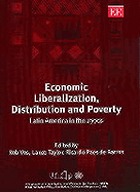 Economic Liberalization, Distribution, and Poverty: Latin America in the 1990s
by
Since the late 1980s, almost all Latin American countries have undergone a series of far-reaching economic reforms, particularly in the areas of financial and capital account liberalization and trade. This book provides a comparative and analytical framew
Economic Liberalization, Distribution, and Poverty: Latin America in the 1990s
by
Since the late 1980s, almost all Latin American countries have undergone a series of far-reaching economic reforms, particularly in the areas of financial and capital account liberalization and trade. This book provides a comparative and analytical framew
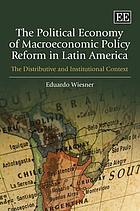 The Political Economy of Macroeconomic Policy Reform in Latin America: the distributive and institutional context
by
Eduardo WiesnerÕs book makes an important contribution to the understanding of development by blending together the interdependent issues of (i) macroeconomic performance and volatility, (ii) equity and distributive justice, (iii) fiscal deficits and the
The Political Economy of Macroeconomic Policy Reform in Latin America: the distributive and institutional context
by
Eduardo WiesnerÕs book makes an important contribution to the understanding of development by blending together the interdependent issues of (i) macroeconomic performance and volatility, (ii) equity and distributive justice, (iii) fiscal deficits and the
 The Economies of Argentina and Brazil: a comparative perspective
by
This book compares the successes and failures of the development and growth processes of Argentina and Brazil. It provides important insights into the different performances of these economies through a series of comparative essays written by Argentinian
The Economies of Argentina and Brazil: a comparative perspective
by
This book compares the successes and failures of the development and growth processes of Argentina and Brazil. It provides important insights into the different performances of these economies through a series of comparative essays written by Argentinian
 When Things Fall Apart: Qualitative Studies of Poverty in the Former Soviet Union
by
Over the past decade, the World Bank has evolved its analysis and reporting on poverty to a multi-dimensional view which includes issues of vulnerability, social isolation, and powerlessness. This broader construct, which considers the concepts of social exclusion and social capital, suggests the need for augmenting quantitative research with qualitative research. Qualitative research provides a focus on understanding human behavior, perceptions and practices that can then be applied to policy development.This report presents specific examples drawn from World Bank work completed in the countries of the former Soviet Union. Each of these examples illustrates the gains that can be derived from combining the use of quantitative and qualitative research methods.
When Things Fall Apart: Qualitative Studies of Poverty in the Former Soviet Union
by
Over the past decade, the World Bank has evolved its analysis and reporting on poverty to a multi-dimensional view which includes issues of vulnerability, social isolation, and powerlessness. This broader construct, which considers the concepts of social exclusion and social capital, suggests the need for augmenting quantitative research with qualitative research. Qualitative research provides a focus on understanding human behavior, perceptions and practices that can then be applied to policy development.This report presents specific examples drawn from World Bank work completed in the countries of the former Soviet Union. Each of these examples illustrates the gains that can be derived from combining the use of quantitative and qualitative research methods.
 Innovation Networks and the New Asian R: a knowledge platform on economic productivityegionalism
by
The rise of Asia, as well as the future of regional cooperation and integration (RCI) the world over, will be profoundly influenced by the challenges of slowing productivity growth, increasing economic inequalities and systemic vulnerabilities. Such struc
Innovation Networks and the New Asian R: a knowledge platform on economic productivityegionalism
by
The rise of Asia, as well as the future of regional cooperation and integration (RCI) the world over, will be profoundly influenced by the challenges of slowing productivity growth, increasing economic inequalities and systemic vulnerabilities. Such struc
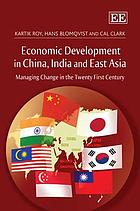 Economic Development in China, India and East Asia: managing change in the twenty first century
by
This is a thorough and comprehensive study Ð both in terms of country coverage and in-depth analysis Ð covering the economic development of all the major economies in the Asian continent, namely China, India, Japan, South Korea, Taiwan, Malaysia and Singa
Economic Development in China, India and East Asia: managing change in the twenty first century
by
This is a thorough and comprehensive study Ð both in terms of country coverage and in-depth analysis Ð covering the economic development of all the major economies in the Asian continent, namely China, India, Japan, South Korea, Taiwan, Malaysia and Singa
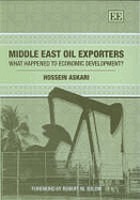 Middle East Oil Exporters: what happened to economic development?
by
Middle East Oil Exporters presents a detailed picture of the economic structure and a critical survey of the recent economic performance of the Middle East. The focus is especially on the large oil-exporting nations, although the smaller producers are rep
Middle East Oil Exporters: what happened to economic development?
by
Middle East Oil Exporters presents a detailed picture of the economic structure and a critical survey of the recent economic performance of the Middle East. The focus is especially on the large oil-exporting nations, although the smaller producers are rep
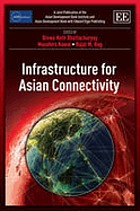 Infrastructure for Asian Connectivity
by
This book addresses the prospects and challenges concerning both soft and hard infrastructure development in Asia and provides a framework for achieving Asian connectivity through regional infrastructure cooperation towards a seamless Asia.
Infrastructure for Asian Connectivity
by
This book addresses the prospects and challenges concerning both soft and hard infrastructure development in Asia and provides a framework for achieving Asian connectivity through regional infrastructure cooperation towards a seamless Asia.
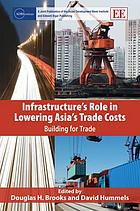 Infrastructure's Role in Lowering Asia's Trade Costs
by
This book analyses and draws policy implications from infrastructureÕs central role in lowering AsiaÕs trade costs.
Infrastructure's Role in Lowering Asia's Trade Costs
by
This book analyses and draws policy implications from infrastructureÕs central role in lowering AsiaÕs trade costs.
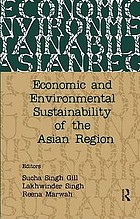 Economic and Environmental Sustainability of the Asian Region
by
Asian economic development and environmental consequences are not only crucial for the wellbeing of the people, but are of great relevance for the global economy. The ongoing intense debate on carbon emission mitigating strategies for reducing the impact of environmental consequences has undermined the principle of equity and put a question mark on the sustainability of the development process of the most dynamic Asian economies. This volume explores fresh perspectives on the issues of wellbeing, Asian economic development and environmental concerns. The book is organised along six themes: issues in sustainability of Asian agriculture; ecological concerns in theory and practice; core themes in economic development; resource management and policy alternatives; discrimination and socio-economic equity in development; and peasant distress and sustainability of cotton economy. The articles are based on unique quantitative data and a rigorous analytical framework for examining policies for an equitable economic and environmental international regime.
Economic and Environmental Sustainability of the Asian Region
by
Asian economic development and environmental consequences are not only crucial for the wellbeing of the people, but are of great relevance for the global economy. The ongoing intense debate on carbon emission mitigating strategies for reducing the impact of environmental consequences has undermined the principle of equity and put a question mark on the sustainability of the development process of the most dynamic Asian economies. This volume explores fresh perspectives on the issues of wellbeing, Asian economic development and environmental concerns. The book is organised along six themes: issues in sustainability of Asian agriculture; ecological concerns in theory and practice; core themes in economic development; resource management and policy alternatives; discrimination and socio-economic equity in development; and peasant distress and sustainability of cotton economy. The articles are based on unique quantitative data and a rigorous analytical framework for examining policies for an equitable economic and environmental international regime.
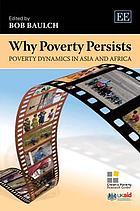 Why Poverty Persists: Poverty Dynamics in Asia and Africa
by
This edited book analyses what traps people in chronic poverty, and what allows them to escape from it, using long-term panel surveys from six Asian and African countries.The distinguishing feature of these studies, which were commissioned by the Chroni
Why Poverty Persists: Poverty Dynamics in Asia and Africa
by
This edited book analyses what traps people in chronic poverty, and what allows them to escape from it, using long-term panel surveys from six Asian and African countries.The distinguishing feature of these studies, which were commissioned by the Chroni
 Poverty Strategies in Asia
by
It is widely recognized that while high and sustained economic growth is critical for poverty reduction, there are other policy interventions that may also be significant in a Ôgrowth plusÕ approach to poverty reduction. This volume brings together a seri
Poverty Strategies in Asia
by
It is widely recognized that while high and sustained economic growth is critical for poverty reduction, there are other policy interventions that may also be significant in a Ôgrowth plusÕ approach to poverty reduction. This volume brings together a seri
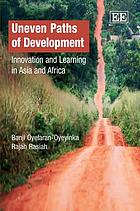 Uneven Paths of Development
by
This book focuses on what can be learned from the complex processes of industrial, technological and organizational change in the sectoral system of information hardware (IH). The IH innovation system is deliberately chosen to illustrate how sectors act a
Uneven Paths of Development
by
This book focuses on what can be learned from the complex processes of industrial, technological and organizational change in the sectoral system of information hardware (IH). The IH innovation system is deliberately chosen to illustrate how sectors act a
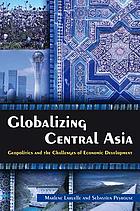 Globalizing Central Asia: geopolitics and the challenges of economic development
by
In this global era, Central Asia must be understood in both geo-economic and geopolitical terms. The region's natural resources compel the attention of rivalrous great powers and ambitious internal factions. The local regimes are caught between the need for international collaborations to valorize these riches and the need to maintain control over them in the interest of state sovereignty. Russia and China dominate the horizon, with other global players close behind; meanwhile, neighboring countries are fractious and unstable with real potential for contagion. This pathbreaking introduction to Central Asia in contemporary international economic and political context answers the needs of both academic and professional audiences and is suitable for course adoption.
Globalizing Central Asia: geopolitics and the challenges of economic development
by
In this global era, Central Asia must be understood in both geo-economic and geopolitical terms. The region's natural resources compel the attention of rivalrous great powers and ambitious internal factions. The local regimes are caught between the need for international collaborations to valorize these riches and the need to maintain control over them in the interest of state sovereignty. Russia and China dominate the horizon, with other global players close behind; meanwhile, neighboring countries are fractious and unstable with real potential for contagion. This pathbreaking introduction to Central Asia in contemporary international economic and political context answers the needs of both academic and professional audiences and is suitable for course adoption.
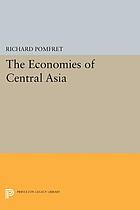 The Economies of Central Asia
by
This book is the first general introduction to the economies of central Asia, specifically the recently independent countries of Uzbekistan, Kazakhstan, Tajikistan, Kyrgyzstan, and Turkmenistan. Richard Pomfret provides a historical and structural analysis of this area of the former Soviet Union, with an emphasis on their economic situation since independence. With the strategic significance of this part of the world growing by the week, this book provides an invaluable source of material for understanding what has been for Westerners a very mysterious part of the world. The first part of the book deals with the five countries' common features, determined by geography and their role in the Soviet division of labor, which left many parts of the region heavily dependent on a cotton monoculture and facing serious environmental problems (notably the shrinking of the Aral Sea and contamination from nuclear testing). The author goes on to deal with the countries as national economies. Finally, he examines common problems facing the countries since they gained independence in late 1991. These last chapters focus on the immediate economic problems of 1992 and 1993 (economic transition and the decision whether to remain within the ruble zone), as well as long-term development issues and international economic relations. Originally published in 1995. The Princeton Legacy Library uses the latest print-on-demand technology to again make available previously out-of-print books from the distinguished backlist of Princeton University Press. These editions preserve the original texts of these important books while presenting them in durable paperback and hardcover editions. The goal of the Princeton Legacy Library is to vastly increase access to the rich scholarly heritage found in the thousands of books published by Princeton University Press since its founding in 1905.
The Economies of Central Asia
by
This book is the first general introduction to the economies of central Asia, specifically the recently independent countries of Uzbekistan, Kazakhstan, Tajikistan, Kyrgyzstan, and Turkmenistan. Richard Pomfret provides a historical and structural analysis of this area of the former Soviet Union, with an emphasis on their economic situation since independence. With the strategic significance of this part of the world growing by the week, this book provides an invaluable source of material for understanding what has been for Westerners a very mysterious part of the world. The first part of the book deals with the five countries' common features, determined by geography and their role in the Soviet division of labor, which left many parts of the region heavily dependent on a cotton monoculture and facing serious environmental problems (notably the shrinking of the Aral Sea and contamination from nuclear testing). The author goes on to deal with the countries as national economies. Finally, he examines common problems facing the countries since they gained independence in late 1991. These last chapters focus on the immediate economic problems of 1992 and 1993 (economic transition and the decision whether to remain within the ruble zone), as well as long-term development issues and international economic relations. Originally published in 1995. The Princeton Legacy Library uses the latest print-on-demand technology to again make available previously out-of-print books from the distinguished backlist of Princeton University Press. These editions preserve the original texts of these important books while presenting them in durable paperback and hardcover editions. The goal of the Princeton Legacy Library is to vastly increase access to the rich scholarly heritage found in the thousands of books published by Princeton University Press since its founding in 1905.
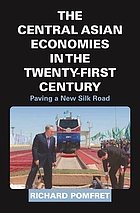 The Central Asian Economies in the Twenty-First Century
by
This book analyzes the Central Asian economies of Kazakhstan, the Kyrgyz Republic, Tajikistan, Turkmenistan, and Uzbekistan, from their buffeting by the commodity boom of the early 2000s to its collapse in 2014. Richard Pomfret examines the countries' relations with external powers and the possibilities for development offered by infrastructure projects as well as rail links between China and Europe. The transition of these nations from centrally planned to market-based economic systems was essentially complete by the early 2000s, when the region experienced a massive increase in world prices for energy and mineral exports. This raised incomes in the main oil and gas exporters, Kazakhstan and Turkmenistan; brought more benefits to the most populous country, Uzbekistan; and left the poorest countries, the Kyrgyz Republic and Tajikistan, dependent on remittances from migrant workers in oil-rich Russia and Kazakhstan. Pomfret considers the enhanced role of the Central Asian nations in the global economy and their varied ties to China, the European Union, Russia, and the United States. With improved infrastructure and connectivity between China and Europe (reflected in regular rail freight services since 2011 and China's announcement of its Belt and Road Initiative in 2013), relaxation of United Nations sanctions against Iran in 2016, and the change in Uzbekistan's presidency in late 2016, a window of opportunity appears to have opened for Central Asian countries to achieve more sustainable economic futures.
The Central Asian Economies in the Twenty-First Century
by
This book analyzes the Central Asian economies of Kazakhstan, the Kyrgyz Republic, Tajikistan, Turkmenistan, and Uzbekistan, from their buffeting by the commodity boom of the early 2000s to its collapse in 2014. Richard Pomfret examines the countries' relations with external powers and the possibilities for development offered by infrastructure projects as well as rail links between China and Europe. The transition of these nations from centrally planned to market-based economic systems was essentially complete by the early 2000s, when the region experienced a massive increase in world prices for energy and mineral exports. This raised incomes in the main oil and gas exporters, Kazakhstan and Turkmenistan; brought more benefits to the most populous country, Uzbekistan; and left the poorest countries, the Kyrgyz Republic and Tajikistan, dependent on remittances from migrant workers in oil-rich Russia and Kazakhstan. Pomfret considers the enhanced role of the Central Asian nations in the global economy and their varied ties to China, the European Union, Russia, and the United States. With improved infrastructure and connectivity between China and Europe (reflected in regular rail freight services since 2011 and China's announcement of its Belt and Road Initiative in 2013), relaxation of United Nations sanctions against Iran in 2016, and the change in Uzbekistan's presidency in late 2016, a window of opportunity appears to have opened for Central Asian countries to achieve more sustainable economic futures.
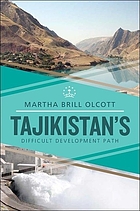 Tajikistan's Difficult Development Path
by
Tajikistan teeters on the brink of failure. This mountainous and landlocked country, the poorest in Central Asia, confronts the challenges of good governance and economic survival. These domestic struggles become even more problematic as international forces prepare to withdraw from neighboring Afghanistan, leaving Central Asian countries to ensure regional stability. In Tajikistan's Difficult Development Path, Martha Brill Olcott traces the political, economic, and social change following the country's independence and international efforts to avert state collapse. The Tajik government's commitment to reform has been inconsistent, and substantial foreign assistance provided since the end of the country's civil war has not led to the desired economic and political development. Olcott concludes that the Tajik leadership faces a serious dilemma: fully embrace reform or continue moving toward state failure. Tajikistan's decision will have very real implications for this troubled region.
Tajikistan's Difficult Development Path
by
Tajikistan teeters on the brink of failure. This mountainous and landlocked country, the poorest in Central Asia, confronts the challenges of good governance and economic survival. These domestic struggles become even more problematic as international forces prepare to withdraw from neighboring Afghanistan, leaving Central Asian countries to ensure regional stability. In Tajikistan's Difficult Development Path, Martha Brill Olcott traces the political, economic, and social change following the country's independence and international efforts to avert state collapse. The Tajik government's commitment to reform has been inconsistent, and substantial foreign assistance provided since the end of the country's civil war has not led to the desired economic and political development. Olcott concludes that the Tajik leadership faces a serious dilemma: fully embrace reform or continue moving toward state failure. Tajikistan's decision will have very real implications for this troubled region.
 The Economy of China
by
The emergence of China since 1979 has been a hallmark in the global economy, not only in the past but also in this century. This comprehensive book provides an analytical view of the remarkable economic development of the most exciting economy in the worl
The Economy of China
by
The emergence of China since 1979 has been a hallmark in the global economy, not only in the past but also in this century. This comprehensive book provides an analytical view of the remarkable economic development of the most exciting economy in the worl
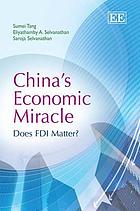 China's Economic Miracle: does FDI matter?
by
This insightful book analyses the impact of Foreign Direct Investment (FDI) in China as well as making valuable contributions to the theory of FDI more broadly. The authors provide empirical analysis of key factors including the location-specific determin
China's Economic Miracle: does FDI matter?
by
This insightful book analyses the impact of Foreign Direct Investment (FDI) in China as well as making valuable contributions to the theory of FDI more broadly. The authors provide empirical analysis of key factors including the location-specific determin
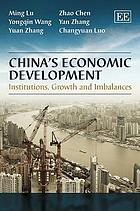 China's Economic Development: Institutions, Growth and Imbalances
by
The authors identify three major factors in the growth of the Chinese economy: economic decentralization and political centralization; the urbanÐrural divide; and relational society. These are explored in depth via analyses of factors including urban and
China's Economic Development: Institutions, Growth and Imbalances
by
The authors identify three major factors in the growth of the Chinese economy: economic decentralization and political centralization; the urbanÐrural divide; and relational society. These are explored in depth via analyses of factors including urban and
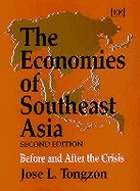 The Economies of Southeast Asia: before and after the crisis
by
This updated and fully revised second edition provides a comprehensive examination of issues of paramount importance for Southeast Asian economies including: the economic implications of the 1997 Asian crisis for both older and newer members of ASEAN; the
The Economies of Southeast Asia: before and after the crisis
by
This updated and fully revised second edition provides a comprehensive examination of issues of paramount importance for Southeast Asian economies including: the economic implications of the 1997 Asian crisis for both older and newer members of ASEAN; the
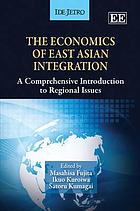 The Economics of East Asian Integration
by
Covering a wide range of aspects surrounding economic integration in East Asia, this well-researched text will appeal to undergraduate and postgraduate students of development studies, regional economics and Asian studies. It will be of particular value t
The Economics of East Asian Integration
by
Covering a wide range of aspects surrounding economic integration in East Asia, this well-researched text will appeal to undergraduate and postgraduate students of development studies, regional economics and Asian studies. It will be of particular value t
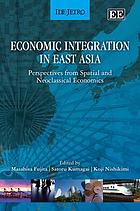 Economic Integration in East Asia: perspectives from spatial and neoclassical economics
by
Increasing numbers of free trade and economic partnership agreements have been concluded among many countries in East Asia, and economic integration has progressed rapidly on both a de facto and de jure basis. However, as the authors of this book argue, i
Economic Integration in East Asia: perspectives from spatial and neoclassical economics
by
Increasing numbers of free trade and economic partnership agreements have been concluded among many countries in East Asia, and economic integration has progressed rapidly on both a de facto and de jure basis. However, as the authors of this book argue, i
 Macroeconomics for Managers
by
This text offers business school students an excellent practical explanation of the short-term linkages in the macroeconomic arena. While the underlying theoretical constructs are not ignored, emphasis is placed on the empirical underpinnings and managerial implications of macroeconomics. The text begins by introducing key concepts such as the GDP, National and Personal Income, and the various measures of inflation and unemployment. Building on this foundation it then analyzes the following aspects of macroeconomics: aggregate supply and demand, international financial markets, cyclical fluctuations, policy analysis, and forecasting. Engages the reader with detailed case studies and "Manager's Briefcase" discussions. Focuses on the short-term linkages in macroeconomics. Uses an empirically oriented approach, while also explaining underlying theoretical constructs. Includes chapter summaries, key concepts, and practice questions. Lecturer resources available at http://www.blackwellpublishing.com/mfm/
Macroeconomics for Managers
by
This text offers business school students an excellent practical explanation of the short-term linkages in the macroeconomic arena. While the underlying theoretical constructs are not ignored, emphasis is placed on the empirical underpinnings and managerial implications of macroeconomics. The text begins by introducing key concepts such as the GDP, National and Personal Income, and the various measures of inflation and unemployment. Building on this foundation it then analyzes the following aspects of macroeconomics: aggregate supply and demand, international financial markets, cyclical fluctuations, policy analysis, and forecasting. Engages the reader with detailed case studies and "Manager's Briefcase" discussions. Focuses on the short-term linkages in macroeconomics. Uses an empirically oriented approach, while also explaining underlying theoretical constructs. Includes chapter summaries, key concepts, and practice questions. Lecturer resources available at http://www.blackwellpublishing.com/mfm/
 Environment and Industry in Developing C: assessing the adoption of environmentally sound technologyountries
by
Industries located in developing countries have made major improvements in environmental performance since the Rio Earth Summit of 1992. More specifically, their record in reducing energy-use and water-pollutant intensities has been better than developed
Environment and Industry in Developing C: assessing the adoption of environmentally sound technologyountries
by
Industries located in developing countries have made major improvements in environmental performance since the Rio Earth Summit of 1992. More specifically, their record in reducing energy-use and water-pollutant intensities has been better than developed
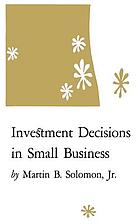 Investment Decisions in Small Business
by
How to choose the investment that will give the best return is a problem faced by all businessmen. Yet for the small businessman in particular, the literature on capital budgeting intended to help him in his investment decisions seems not to apply to his actual situation. Here in this study, theory and practice are brought together within the context of small business. Author Martin B. Solomon Jr. compares two theoretically sound formulas -- present value and the discounted rate of return -- with simpler methods of calculating the returns on investments. The superiority of the refined methods, he points out, is practically nullified under the usual conditions of uncertainty. The primary need of the small businessman, Solomon concludes, is not for better methods of ranking alternatives but for the reservation of a portion of his time for seeking a variety of investment opportunities through the greater exercise of imagination and creativity.
Investment Decisions in Small Business
by
How to choose the investment that will give the best return is a problem faced by all businessmen. Yet for the small businessman in particular, the literature on capital budgeting intended to help him in his investment decisions seems not to apply to his actual situation. Here in this study, theory and practice are brought together within the context of small business. Author Martin B. Solomon Jr. compares two theoretically sound formulas -- present value and the discounted rate of return -- with simpler methods of calculating the returns on investments. The superiority of the refined methods, he points out, is practically nullified under the usual conditions of uncertainty. The primary need of the small businessman, Solomon concludes, is not for better methods of ranking alternatives but for the reservation of a portion of his time for seeking a variety of investment opportunities through the greater exercise of imagination and creativity.
 New product development : process benchmarks and performance metrics
by
New product development : process benchmarks and performance metrics
by
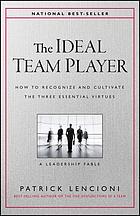 The Ideal Team Player: how to recognize and cultivate the three essential virtues : a leadership fable
by
In his classic book, The Five Dysfunctions of a Team, Patrick Lencioni laid out a groundbreaking approach for tackling the perilous group behaviors that destroy teamwork. Here he turns his focus to the individual, revealing the three indispensable virtues of an ideal team player. In The Ideal Team Player, Lencioni tells the story of Jeff Shanley, a leader desperate to save his uncle's company by restoring its cultural commitment to teamwork. Jeff must crack the code on the virtues that real team players possess, and then build a culture of hiring and development around those virtues. Beyond the fable, Lencioni presents a practical framework and actionable tools for identifying, hiring, and developing ideal team players. Whether you're a leader trying to create a culture around teamwork, a staffing professional looking to hire real team players, or a team player wanting to improve yourself, this book will prove to be as useful as it is compelling.
The Ideal Team Player: how to recognize and cultivate the three essential virtues : a leadership fable
by
In his classic book, The Five Dysfunctions of a Team, Patrick Lencioni laid out a groundbreaking approach for tackling the perilous group behaviors that destroy teamwork. Here he turns his focus to the individual, revealing the three indispensable virtues of an ideal team player. In The Ideal Team Player, Lencioni tells the story of Jeff Shanley, a leader desperate to save his uncle's company by restoring its cultural commitment to teamwork. Jeff must crack the code on the virtues that real team players possess, and then build a culture of hiring and development around those virtues. Beyond the fable, Lencioni presents a practical framework and actionable tools for identifying, hiring, and developing ideal team players. Whether you're a leader trying to create a culture around teamwork, a staffing professional looking to hire real team players, or a team player wanting to improve yourself, this book will prove to be as useful as it is compelling.
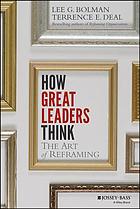 How Great Leaders Think: the art of reframing
by
The proven model that offers powerful and elegant strategies for leaders How Great Leaders Think: the Art of Reframing uses compelling, contemporary examples to show how more complex thinking is the key to better leadership. Leaders who understand what's going on around them see what they need to do to achieve the results they want. Bolman and Deal's influential four-frame model of leadership and organizations--developed in their bestselling book, Reframing Organizations: Artistry Choice and Leadership--offers leaders an accessible guide for understanding four major aspects of organizational life: structure, people, politics, and culture. Tapping into the complexity enables leaders to decode the messy world in which they live, see more options, tell better stories, and find strategies that are more effective. Case examples of leaders like Jeff Bezos at Amazon, Howard Schultz at Starbucks, Tony Hsieh at Zappos, Ursula Burns at Xerox, and the late Steve Jobs at Apple provide concrete lessons that readers can put to use in their own leadership. The book's lessons include: How to use structural tools to organize teams and organizations for better results How to build motivation and morale by aligning organizations and people How to map the terrain and build a power base to navigate the political dynamics in organizations How to develop a leadership story that shapes culture, provides direction, and inspires commitment to excellence
How Great Leaders Think: the art of reframing
by
The proven model that offers powerful and elegant strategies for leaders How Great Leaders Think: the Art of Reframing uses compelling, contemporary examples to show how more complex thinking is the key to better leadership. Leaders who understand what's going on around them see what they need to do to achieve the results they want. Bolman and Deal's influential four-frame model of leadership and organizations--developed in their bestselling book, Reframing Organizations: Artistry Choice and Leadership--offers leaders an accessible guide for understanding four major aspects of organizational life: structure, people, politics, and culture. Tapping into the complexity enables leaders to decode the messy world in which they live, see more options, tell better stories, and find strategies that are more effective. Case examples of leaders like Jeff Bezos at Amazon, Howard Schultz at Starbucks, Tony Hsieh at Zappos, Ursula Burns at Xerox, and the late Steve Jobs at Apple provide concrete lessons that readers can put to use in their own leadership. The book's lessons include: How to use structural tools to organize teams and organizations for better results How to build motivation and morale by aligning organizations and people How to map the terrain and build a power base to navigate the political dynamics in organizations How to develop a leadership story that shapes culture, provides direction, and inspires commitment to excellence
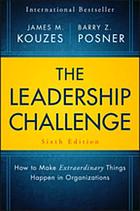 The Leadership Challenge
by
The most trusted source of leadership wisdom, updated to address today's realities The Leadership Challenge is the gold-standard manual for effective leadership, grounded in research and written by the premier authorities in the field. With deep insight into the complex interpersonal dynamics of the workplace, this book positions leadership both as a skill to be learned, and as a relationship that must be nurtured to reach its full potential. This new sixth edition has been revised to address current challenges, and includes more international examples and a laser focus on business issues; you'll learn how extraordinary leaders accomplish extraordinary things, and how to develop your leadership skills and style to deliver quality results every time. Engaging stories delve into the fundamental roles that great leaders fulfill, and simple frameworks provide a primer for those who seek continuous improvement; by internalizing key insights and putting concepts into action, you'll become a more effective, more impactful leader. A good leader gets things done; a great leader aspires, inspires, and achieves more. This book highlights the differences between good and great, and shows you how to bridge the chasm between getting things done and making things happen. Gain deep insight into leadership's critical role in organizational health Navigate the shift toward team-oriented work relationships Motivate and inspire to break through the pervasive new cynicism Leverage the electronic global village to deliver better results Business is evolving at an increasingly rapid rate, and leaders must keep pace with the changes or risk stagnation. People work differently, are motivated differently, and have different expectations today--business as usual is quickly losing its effectiveness. The Leadership Challenge helps you stay current, relevant, and effective in the modern workplace.
The Leadership Challenge
by
The most trusted source of leadership wisdom, updated to address today's realities The Leadership Challenge is the gold-standard manual for effective leadership, grounded in research and written by the premier authorities in the field. With deep insight into the complex interpersonal dynamics of the workplace, this book positions leadership both as a skill to be learned, and as a relationship that must be nurtured to reach its full potential. This new sixth edition has been revised to address current challenges, and includes more international examples and a laser focus on business issues; you'll learn how extraordinary leaders accomplish extraordinary things, and how to develop your leadership skills and style to deliver quality results every time. Engaging stories delve into the fundamental roles that great leaders fulfill, and simple frameworks provide a primer for those who seek continuous improvement; by internalizing key insights and putting concepts into action, you'll become a more effective, more impactful leader. A good leader gets things done; a great leader aspires, inspires, and achieves more. This book highlights the differences between good and great, and shows you how to bridge the chasm between getting things done and making things happen. Gain deep insight into leadership's critical role in organizational health Navigate the shift toward team-oriented work relationships Motivate and inspire to break through the pervasive new cynicism Leverage the electronic global village to deliver better results Business is evolving at an increasingly rapid rate, and leaders must keep pace with the changes or risk stagnation. People work differently, are motivated differently, and have different expectations today--business as usual is quickly losing its effectiveness. The Leadership Challenge helps you stay current, relevant, and effective in the modern workplace.
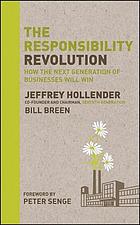 The Responsibility Revolution: how the next generation of businesses will win
by
How to create a company that not only sustains, but surpasses-that moves beyond the imperative to be "less bad" and embrace an ethos to be "all good" From the Inspired Protagonist and Chairman of Seventh Generation, the country's leading brand of household products and a pioneering "good company," comes a one-of-a-kind book for leaders, entrepreneurs, and change agents everywhere. The Responsibility Revolution reveals the smartest ways for companies to build a better future-and hold themselves accountable for the results. Thousands of companies have pledged to act responsibly; very few have proven that they know how. This book will guide them. The Responsibility Revolution presents fresh ideas and actionable strategies to commit your company to a genuine socially and environmentally responsible business and culture, one that not only competes but wins on values. Points the way for innovators and influencers to generate trust by becoming transparent, elicit people's passion and creativity, turn customers into collaborators, transform critics into allies, rewrite the rules and reinvent business Shows how to build a socially and environmentally responsible yet genuinely good company and an authentic brand Drawing on groundbreaking interviews with real-world change leaders, Hollender and Breen present lessons and insights from the "good company"' parts of big companies like IBM and eBay, trailblazers like Patagonia and Timberland, and emerging dynamos like Linden Lab and Etsy The Responsibility Revolution equips people with the tactics, models, and mind-sets they need to compete in a world where consumers now demand that companies contribute to the greater good.
The Responsibility Revolution: how the next generation of businesses will win
by
How to create a company that not only sustains, but surpasses-that moves beyond the imperative to be "less bad" and embrace an ethos to be "all good" From the Inspired Protagonist and Chairman of Seventh Generation, the country's leading brand of household products and a pioneering "good company," comes a one-of-a-kind book for leaders, entrepreneurs, and change agents everywhere. The Responsibility Revolution reveals the smartest ways for companies to build a better future-and hold themselves accountable for the results. Thousands of companies have pledged to act responsibly; very few have proven that they know how. This book will guide them. The Responsibility Revolution presents fresh ideas and actionable strategies to commit your company to a genuine socially and environmentally responsible business and culture, one that not only competes but wins on values. Points the way for innovators and influencers to generate trust by becoming transparent, elicit people's passion and creativity, turn customers into collaborators, transform critics into allies, rewrite the rules and reinvent business Shows how to build a socially and environmentally responsible yet genuinely good company and an authentic brand Drawing on groundbreaking interviews with real-world change leaders, Hollender and Breen present lessons and insights from the "good company"' parts of big companies like IBM and eBay, trailblazers like Patagonia and Timberland, and emerging dynamos like Linden Lab and Etsy The Responsibility Revolution equips people with the tactics, models, and mind-sets they need to compete in a world where consumers now demand that companies contribute to the greater good.
 An Introduction to Social Entrepreneurship: voices, preconditions, contexts
by
This timely book sets social entrepreneurship in a historical context, from its philanthropic beginnings in the Victorian era to the present day, against the backdrop of contemporary global capitalism.
An Introduction to Social Entrepreneurship: voices, preconditions, contexts
by
This timely book sets social entrepreneurship in a historical context, from its philanthropic beginnings in the Victorian era to the present day, against the backdrop of contemporary global capitalism.
 Environmental Entrepreneurship in the Developing World : markets meet the environment in unexpected places
by
In this innovative book, Laura E. Huggins finds path breaking entrepreneurial solutions to difficult environmental challenges in some of the world's poorest areas.The approaches entrepreneurs are taking to these challenges involve establishing property rights and encouraging market exchange. From beehives to barbed wire, these tools are creating positive incentives and promoting both economic development and environmental improvements. The case studies are from the developing world and reveal where the biggest victories for less poverty and more conservation can be won. The pursuit begins by learning from local people solving local problems.Environmental Entrepreneurship encourages a broad audience to consider secure property rights and free markets as key ingredients to moving out of poverty and improving environmental quality at the same time. It will appeal to academics and students of environmental studies, environmental economics, environmental policy, as well as international development and business. Entrepreneurs and environmental groups such as The Nature Conservancy, Conservation International, and The World Resources Institute will also find a wealth of invaluable information in this book.
Environmental Entrepreneurship in the Developing World : markets meet the environment in unexpected places
by
In this innovative book, Laura E. Huggins finds path breaking entrepreneurial solutions to difficult environmental challenges in some of the world's poorest areas.The approaches entrepreneurs are taking to these challenges involve establishing property rights and encouraging market exchange. From beehives to barbed wire, these tools are creating positive incentives and promoting both economic development and environmental improvements. The case studies are from the developing world and reveal where the biggest victories for less poverty and more conservation can be won. The pursuit begins by learning from local people solving local problems.Environmental Entrepreneurship encourages a broad audience to consider secure property rights and free markets as key ingredients to moving out of poverty and improving environmental quality at the same time. It will appeal to academics and students of environmental studies, environmental economics, environmental policy, as well as international development and business. Entrepreneurs and environmental groups such as The Nature Conservancy, Conservation International, and The World Resources Institute will also find a wealth of invaluable information in this book.
 The Magic of Tiny Business: you don't have to go big to make a great living
by
"This is a powerful book--tiny is mighty. Sharon Rowe's simple shift in thinking is a profound idea, precisely what we need to hear." --Seth Godin, author of Linchpin Too many of us feel trapped by work that keeps us from living our purpose. We fantasize about starting our own business, yet we're warned against falling into debt, working eighty hours a week, and coping with the pressure to grow. Eco-Bags Products founder Sharon Rowe says there's another way: go tiny. Like a tiny house, a tiny business is built on maintaining a laser focus on what is essential by living an intentional life. As an entrepreneur and mother, Rowe is most concerned with putting family first, maintaining financial security, and doing something that makes an impact in the world. Using the success story of Eco-Bags Products, Rowe distills the step-by-step process of building a profitable, right-scaled, sustainable venture that doesn't compromise your values. She shows you how to test your concept, manage your money and priorities, and more, while staying true to the "tiny" ethos.
The Magic of Tiny Business: you don't have to go big to make a great living
by
"This is a powerful book--tiny is mighty. Sharon Rowe's simple shift in thinking is a profound idea, precisely what we need to hear." --Seth Godin, author of Linchpin Too many of us feel trapped by work that keeps us from living our purpose. We fantasize about starting our own business, yet we're warned against falling into debt, working eighty hours a week, and coping with the pressure to grow. Eco-Bags Products founder Sharon Rowe says there's another way: go tiny. Like a tiny house, a tiny business is built on maintaining a laser focus on what is essential by living an intentional life. As an entrepreneur and mother, Rowe is most concerned with putting family first, maintaining financial security, and doing something that makes an impact in the world. Using the success story of Eco-Bags Products, Rowe distills the step-by-step process of building a profitable, right-scaled, sustainable venture that doesn't compromise your values. She shows you how to test your concept, manage your money and priorities, and more, while staying true to the "tiny" ethos.
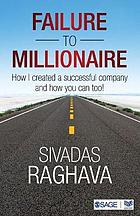 Failure to millionaire : how I created a successful company and how you can too!
by
Failure to millionaire : how I created a successful company and how you can too!
by
 The Elgar Companion to Development Studies
by
The Elgar Companion to Development Studies is an innovative and unique reference book that includes original contributions covering development economics as well as development studies broadly defined. This major new Companion brings together an internati
The Elgar Companion to Development Studies
by
The Elgar Companion to Development Studies is an innovative and unique reference book that includes original contributions covering development economics as well as development studies broadly defined. This major new Companion brings together an internati
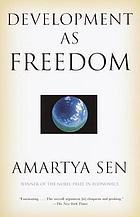 Development as freedom
by
"In Development as Freedom Amartya Sen explains how in a world of unprecedented increase in overall opulence millions of people living in the Third World are still unfree. Even if they are not technically slaves, they are denied elementary freedoms and remain imprisoned in one way or another by economic poverty, social deprivation, political tyranny or cultural authoritarianism. The main purpose of development is to spread freedom and its 'thousand charms' to the unfree citizens. Freedom, Sen persuasively argues, is at once the ultimate goal of social and economic arrangements and the most efficient means of realizing general welfare. Social institutions like markets, political parties, legislatures, the judiciary, and the media contribute to development by enhancing individual freedom and are in turn sustained by social values. Values, institutions, development, and freedom are all closely interrelated, and Sen links them together in an elegant analytical framework. By asking 'What is the relation between our collective economic wealth and our individual ability to live as we would like?' and by incorporating individual freedom as a social commitment into his analysis Sen allows economics once again, as it did in the time of Adam Smith, to address the social basis of individual well-being and freedom."--Provided by publisher.
Development as freedom
by
"In Development as Freedom Amartya Sen explains how in a world of unprecedented increase in overall opulence millions of people living in the Third World are still unfree. Even if they are not technically slaves, they are denied elementary freedoms and remain imprisoned in one way or another by economic poverty, social deprivation, political tyranny or cultural authoritarianism. The main purpose of development is to spread freedom and its 'thousand charms' to the unfree citizens. Freedom, Sen persuasively argues, is at once the ultimate goal of social and economic arrangements and the most efficient means of realizing general welfare. Social institutions like markets, political parties, legislatures, the judiciary, and the media contribute to development by enhancing individual freedom and are in turn sustained by social values. Values, institutions, development, and freedom are all closely interrelated, and Sen links them together in an elegant analytical framework. By asking 'What is the relation between our collective economic wealth and our individual ability to live as we would like?' and by incorporating individual freedom as a social commitment into his analysis Sen allows economics once again, as it did in the time of Adam Smith, to address the social basis of individual well-being and freedom."--Provided by publisher.
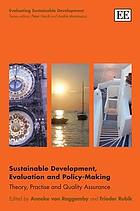 Sustainable Development, Evaluation and Policy-Making: theory, practise and quality assurance
by
This pathbreaking book contributes to the discourse of evidence-based policy-making. It does so by combining the two issues of policy evaluation and sustainable development linking both to the policy-cycle.
Sustainable Development, Evaluation and Policy-Making: theory, practise and quality assurance
by
This pathbreaking book contributes to the discourse of evidence-based policy-making. It does so by combining the two issues of policy evaluation and sustainable development linking both to the policy-cycle.
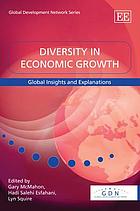 Diversity in Economic Growth: global insights and explanations
by
Diversity in Economic Growth: global insights and explanations
by
 Development economics and structuralist macroeconomics : essays in honor of Lance Taylor
by
Lance Taylor is widely considered to be one of the pre-eminent development economists in the world and is known for his work on development planning, macroeconomics of development, stabilization policy, and the global economy. He has also been the major force behind structuralist economics, which is seen by many to be a major alternative to orthodox development economics and policy prescriptions. The essays in this volume, written by well-known scholars in their own right, make contributions to each of these areas while honoring the contributions made by Lance Taylor.
Development economics and structuralist macroeconomics : essays in honor of Lance Taylor
by
Lance Taylor is widely considered to be one of the pre-eminent development economists in the world and is known for his work on development planning, macroeconomics of development, stabilization policy, and the global economy. He has also been the major force behind structuralist economics, which is seen by many to be a major alternative to orthodox development economics and policy prescriptions. The essays in this volume, written by well-known scholars in their own right, make contributions to each of these areas while honoring the contributions made by Lance Taylor.
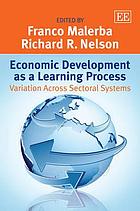 Economic Development as a Learning Process: variation across sectoral systems
by
Until recently, economists studying economic development have tended to consider it a universal process, or focussed their attention on common aspects. This book originates from the growing recognition of significant sectoral differences in economic devel
Economic Development as a Learning Process: variation across sectoral systems
by
Until recently, economists studying economic development have tended to consider it a universal process, or focussed their attention on common aspects. This book originates from the growing recognition of significant sectoral differences in economic devel
 Economic Growth and Change: national and regional patterns of convergence and divergence
by
The pursuit of economic growth is at the top of every nation's policy agenda at the end of the 20th century. This authoritative and comprehensive book goes beyond the narrowly-based convergence model of economic growth by considering global, national and regional patterns of growth from a comparative perspective. Issues examined include:* the evolution of the firm and the role of R&D* long-term implications of the loss of national sovereignty * international 'openness'* social and political institutions* patterns of regional harmonization in the United States, particularly income and earnings trends across states and the reasons for convergence* persistent regional disparities in Europe including the roles of sectoral transformation, regional spillovers, human capital formation and the allocation of structural funds* the experience of convergence in individual countries including Italy, the UK, Spain and Germany
Economic Growth and Change: national and regional patterns of convergence and divergence
by
The pursuit of economic growth is at the top of every nation's policy agenda at the end of the 20th century. This authoritative and comprehensive book goes beyond the narrowly-based convergence model of economic growth by considering global, national and regional patterns of growth from a comparative perspective. Issues examined include:* the evolution of the firm and the role of R&D* long-term implications of the loss of national sovereignty * international 'openness'* social and political institutions* patterns of regional harmonization in the United States, particularly income and earnings trends across states and the reasons for convergence* persistent regional disparities in Europe including the roles of sectoral transformation, regional spillovers, human capital formation and the allocation of structural funds* the experience of convergence in individual countries including Italy, the UK, Spain and Germany
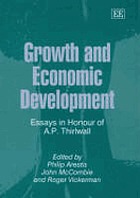 Growth and Economic Development: essays in honour of A.P. Thirlwall
by
This valuable and engaging new book bears eloquent testimony to A.P. ThirlwallÕs substantial contribution to economics over the last 40 years. The volume does not attempt to provide a comprehensive review of such a prolific figure, but rather demonstrates
Growth and Economic Development: essays in honour of A.P. Thirlwall
by
This valuable and engaging new book bears eloquent testimony to A.P. ThirlwallÕs substantial contribution to economics over the last 40 years. The volume does not attempt to provide a comprehensive review of such a prolific figure, but rather demonstrates
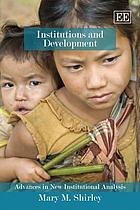 Institutions and Development
by
A landmark contribution to our understanding of economic development.This significant book argues that fundamental changes in deeply rooted institutions do not happen because of outsidersÕ money, advice, pressures, or even physical force; which explains
Institutions and Development
by
A landmark contribution to our understanding of economic development.This significant book argues that fundamental changes in deeply rooted institutions do not happen because of outsidersÕ money, advice, pressures, or even physical force; which explains
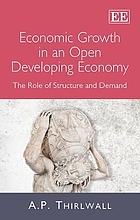 Economic Growth in an Open Developing Economy: the role of structure and demand
by
This concise yet insightful sequel to the highly acclaimed The Nature of Economic Growth provides a comprehensive critique of both old and new growth theory, highlighting the importance of economic growth for reducing poverty.A.P. Thirlwall illustrates that orthodox growth theory continues to work with 'one-good' models and to treat factor supplies as exogenously given, independent of demand. Orthodox trade theory still ignores the balance of payments consequences of different patterns of trade specialisation when assessing the welfare effects of trade. The author goes on to present theory underpinned by up-to-date empirical evidence that factors of production and productivity growth are endogenous to demand, and that the structure of production and trade matter for the long-run growth performance of countries because of their impact on the balance of payments. He concludes that trade liberalisation has proved disappointing in improving the trade-off between growth and the balance of payments.This book will provide a challenging read for students and academics in the fields of economics, heterodox economics, and development. Policymakers focussing on the relationship between growth, trade and the balance of payments will also find the book to be of great interest.
Economic Growth in an Open Developing Economy: the role of structure and demand
by
This concise yet insightful sequel to the highly acclaimed The Nature of Economic Growth provides a comprehensive critique of both old and new growth theory, highlighting the importance of economic growth for reducing poverty.A.P. Thirlwall illustrates that orthodox growth theory continues to work with 'one-good' models and to treat factor supplies as exogenously given, independent of demand. Orthodox trade theory still ignores the balance of payments consequences of different patterns of trade specialisation when assessing the welfare effects of trade. The author goes on to present theory underpinned by up-to-date empirical evidence that factors of production and productivity growth are endogenous to demand, and that the structure of production and trade matter for the long-run growth performance of countries because of their impact on the balance of payments. He concludes that trade liberalisation has proved disappointing in improving the trade-off between growth and the balance of payments.This book will provide a challenging read for students and academics in the fields of economics, heterodox economics, and development. Policymakers focussing on the relationship between growth, trade and the balance of payments will also find the book to be of great interest.
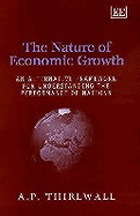 The Nature of Economic Growth: an alternative framework for understanding the performance of nations
by
This concise book, by one of the leading scholars in development economics, has been developed from a series of lectures given to masters students and will serve as an excellent introduction to the principles of growth and development theory.
The Nature of Economic Growth: an alternative framework for understanding the performance of nations
by
This concise book, by one of the leading scholars in development economics, has been developed from a series of lectures given to masters students and will serve as an excellent introduction to the principles of growth and development theory.
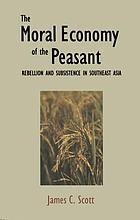 The Moral Economy of the Peasant : rebellion and subsistence in Southeast Asia
by
The Moral Economy of the Peasant : rebellion and subsistence in Southeast Asia
by
 The Economics of Water Management in Southern Africa
by
This book presents a valuable new tool for water management Ð water resource accounting Ð which significantly advances the economic analysis of water. Water resource accounts integrate detailed information about water supply and use with national income a
The Economics of Water Management in Southern Africa
by
This book presents a valuable new tool for water management Ð water resource accounting Ð which significantly advances the economic analysis of water. Water resource accounts integrate detailed information about water supply and use with national income a
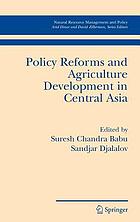 Policy Reforms and Agriculture Development in Central Asia
by
Achieving sustainable agricultural development is at the forefront of the poverty reduction objective of the Central Asian republics - Kazakhstan, the Kyrgyz Republic, Tajikistan, Turkmenistan, and Uzbekistan. Since independence, the countries of the Central Asian region have undergone a series of transition from centrally planned economies to a more market oriented system. Wide-ranging policy reforms have been implemented, although in varying degrees, in the five Central Asian countries. Despite great efforts by the countries and the external advice and efforts of international agencies to help them to follow a dynamic growth path, the progress in policy reforms has been frustratingly slow. Generating momentum to reorient the approach and the sequencing of policy reform packages will require rethinking of the policy reform process. This is particularly so in the food, agriculture, and natural resource sectors. This further requires improved understanding among the policymakers, donors, and international agencies of the impact of policy alternatives so that policy reforms and the speed with which they have been implemented are consistent with the objectives and the social and political realities of individual countries in the region. Involving the local policy research community in identifying critical issues and challenges, setting priorities among them for food and agricultural and natural resource policy research and analysis, and implementing joint research studies is the best way to generate knowledge on the impact of policy reforms and to increase ownership of policy design and implementation.
Policy Reforms and Agriculture Development in Central Asia
by
Achieving sustainable agricultural development is at the forefront of the poverty reduction objective of the Central Asian republics - Kazakhstan, the Kyrgyz Republic, Tajikistan, Turkmenistan, and Uzbekistan. Since independence, the countries of the Central Asian region have undergone a series of transition from centrally planned economies to a more market oriented system. Wide-ranging policy reforms have been implemented, although in varying degrees, in the five Central Asian countries. Despite great efforts by the countries and the external advice and efforts of international agencies to help them to follow a dynamic growth path, the progress in policy reforms has been frustratingly slow. Generating momentum to reorient the approach and the sequencing of policy reform packages will require rethinking of the policy reform process. This is particularly so in the food, agriculture, and natural resource sectors. This further requires improved understanding among the policymakers, donors, and international agencies of the impact of policy alternatives so that policy reforms and the speed with which they have been implemented are consistent with the objectives and the social and political realities of individual countries in the region. Involving the local policy research community in identifying critical issues and challenges, setting priorities among them for food and agricultural and natural resource policy research and analysis, and implementing joint research studies is the best way to generate knowledge on the impact of policy reforms and to increase ownership of policy design and implementation.
 Innovation and Small Enterprises in the Third World
by
Innovation is crucial for small enterprises to become and remain competitive in the global economy. In this book, the authors have combined theoretical insights with comprehensive case studies on innovation among small-scale enterprises in developing coun
Innovation and Small Enterprises in the Third World
by
Innovation is crucial for small enterprises to become and remain competitive in the global economy. In this book, the authors have combined theoretical insights with comprehensive case studies on innovation among small-scale enterprises in developing coun
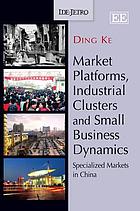 Market Platforms, Industrial Clusters and Small Bus: specialized markets in Chinainess Dynamics
by
Specialized markets are a unique product of ChinaÕs economic transition. They are marketplaces located in industrial clusters, specializing in the wholesale of local commodities and related goods. Ding Ke reveals that, despite their seemingly primitive fo
Market Platforms, Industrial Clusters and Small Bus: specialized markets in Chinainess Dynamics
by
Specialized markets are a unique product of ChinaÕs economic transition. They are marketplaces located in industrial clusters, specializing in the wholesale of local commodities and related goods. Ding Ke reveals that, despite their seemingly primitive fo
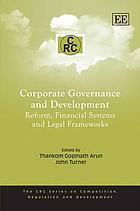 Corporate Governance and Development: reform, financial systems and legal frameworks
by
This book analyses the complex relationship between corporate governance and economic development by focusing on the reform of corporate governance, the role of the legal system, and the interconnections with the financial system.
Corporate Governance and Development: reform, financial systems and legal frameworks
by
This book analyses the complex relationship between corporate governance and economic development by focusing on the reform of corporate governance, the role of the legal system, and the interconnections with the financial system.
 Monopolies and Underdevelopment
by
This ambitious analysis is centered on the evolution of economic structures in colonized economies, showing the effects of these structures on today's global reality for all economies, whether they are considered 'developed' or 'underdeveloped.' The resul
Monopolies and Underdevelopment
by
This ambitious analysis is centered on the evolution of economic structures in colonized economies, showing the effects of these structures on today's global reality for all economies, whether they are considered 'developed' or 'underdeveloped.' The resul
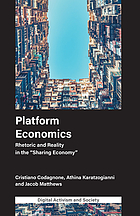 Platform Economics : Rhetoric and Reality in the Sharing Economy
by
Platform Economics tackles head on the rhetoric surrounding the so-called "sharing economy", which has muddied public debate and has contributed to a lack of policy and regulatory intervention.The book sheds light on the sharing economy debate by offering an in-depth analysis both of rhetoric employed by sharing economy actors, and by mapping key aspects of digital labour markets. The platform is discussed both as a source of innovation and growth and as a matter of policy concern over competition, tax collection, consumers' protection, privacy, and algorithms transparency, and the future of work.The authors show that actors in the sharing economy have not only used the narratives describing the initial phase of the sharing movement to their advantage, but have also succeeded in enlisting diffuse interests as their allies. The authors' research draws particular attention to the predicted advent of technological unemployment in conjunction with widespread concern over the robotisation of jobs.Advocating an inter-disciplinary approach in which economics, sociology, anthropology, legal studies, and rhetorical analysis converge, this text will prove invaluable to students, researchers and economists alike.
Platform Economics : Rhetoric and Reality in the Sharing Economy
by
Platform Economics tackles head on the rhetoric surrounding the so-called "sharing economy", which has muddied public debate and has contributed to a lack of policy and regulatory intervention.The book sheds light on the sharing economy debate by offering an in-depth analysis both of rhetoric employed by sharing economy actors, and by mapping key aspects of digital labour markets. The platform is discussed both as a source of innovation and growth and as a matter of policy concern over competition, tax collection, consumers' protection, privacy, and algorithms transparency, and the future of work.The authors show that actors in the sharing economy have not only used the narratives describing the initial phase of the sharing movement to their advantage, but have also succeeded in enlisting diffuse interests as their allies. The authors' research draws particular attention to the predicted advent of technological unemployment in conjunction with widespread concern over the robotisation of jobs.Advocating an inter-disciplinary approach in which economics, sociology, anthropology, legal studies, and rhetorical analysis converge, this text will prove invaluable to students, researchers and economists alike.
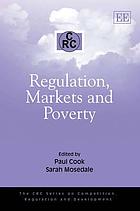 Regulation, Markets and Poverty
by
Regulation, Markets and Poverty
by
 Labour Markets, Institutions and Inequality : building just societies in the 21st century
by
'A de?ning feature of recent decades has been the rise in income inequality within many, but certainly not all, countries, and perhaps most spectacularly in the US and UK. The reigning explanation remains the orthodox story that it's all about supply and demand.... A powerful and welcome antidote, the essays in this ?ne book make the case that strong institutions are not only "the building blocks of just societies", but can be, if well-designed, fully consistent with high employment and dynamic economies.'- David R. Howell, New School for Public Engagement, New York, USLabour market institutions, including collective bargaining, the regulation of employment contracts and social protection policies, are instrumental for improving the well-being of workers, their families and society. In many countries, these institutions have been eroded, whilst in other countries they do not exist at all.
Labour Markets, Institutions and Inequality : building just societies in the 21st century
by
'A de?ning feature of recent decades has been the rise in income inequality within many, but certainly not all, countries, and perhaps most spectacularly in the US and UK. The reigning explanation remains the orthodox story that it's all about supply and demand.... A powerful and welcome antidote, the essays in this ?ne book make the case that strong institutions are not only "the building blocks of just societies", but can be, if well-designed, fully consistent with high employment and dynamic economies.'- David R. Howell, New School for Public Engagement, New York, USLabour market institutions, including collective bargaining, the regulation of employment contracts and social protection policies, are instrumental for improving the well-being of workers, their families and society. In many countries, these institutions have been eroded, whilst in other countries they do not exist at all.
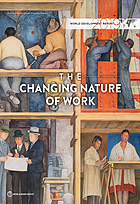 World development report. 2019, The changing nature of work.
by
World development report. 2019, The changing nature of work.
by
 Fair progress? : economic mobility across generations around the world
by
Fair progress? : economic mobility across generations around the world
by
 Working Women in the U. S.
by
Working Women in the U. S.
by
 Food Security in a Food Abundant World
by
Food insecurity can result from various events. When food is abundant, the entitlement to food is limited by endowments, the ability to trade, and potential transfers from family or the government. This volume utilizes a country and regional perspective to examine food insecurity. We consider the interaction between income and the share of household expenditures on food. The epidemiological risk assessment approach to food security issues is utilized as a function of agricultural and production, food distribution, and health policies. The interdependence of food security and climate change is examined. Overall trends in economic growth and poverty reduction, constraints and bottlenecks in agricultural productivity growth, regional trade agreements, and other influential policies are reviewed and discussed. We also consider food security as related to food consumption patterns and obesity. The role of income diversification as well as the impact of Farmer School Fields on food security are examined. The impact of inheritance and transfer entitlements is examined as we consider the role of remittances as well as 'ganyu' or casual labor in determining food security.
Food Security in a Food Abundant World
by
Food insecurity can result from various events. When food is abundant, the entitlement to food is limited by endowments, the ability to trade, and potential transfers from family or the government. This volume utilizes a country and regional perspective to examine food insecurity. We consider the interaction between income and the share of household expenditures on food. The epidemiological risk assessment approach to food security issues is utilized as a function of agricultural and production, food distribution, and health policies. The interdependence of food security and climate change is examined. Overall trends in economic growth and poverty reduction, constraints and bottlenecks in agricultural productivity growth, regional trade agreements, and other influential policies are reviewed and discussed. We also consider food security as related to food consumption patterns and obesity. The role of income diversification as well as the impact of Farmer School Fields on food security are examined. The impact of inheritance and transfer entitlements is examined as we consider the role of remittances as well as 'ganyu' or casual labor in determining food security.
 Cape Wind: money, celebrity, class, politics, and the battle for our energy future on Nantucket Sound
by
When Jim Gordon set out to build a wind farm off the coast of Cape Cod, he knew some people might object. But there was a lot of merit in creating a privately funded, clean energy source for energy-starved New England, and he felt sure most people would recognize it eventually. Instead, all Hell broke loose. Gordon had unwittingly challenged the privileges of some of America's richest and most politically connected people, and they would fight him tooth and nail, no matter what it cost, and even when it made no sense. Cape Wind is a rollicking tale of democracy in action and plutocracy in the raw as played out among colorful and glamorous characters on one of our country's most historic and renowned pieces of coastline. As steeped in American history and local color as The Prince of Providence; as biting, revealing and fun as Philistines at the Hedgerow, it is also a cautionary tale about how money can hijack democracy while America lags behind the rest of the developed world in adopting clean energy.
Cape Wind: money, celebrity, class, politics, and the battle for our energy future on Nantucket Sound
by
When Jim Gordon set out to build a wind farm off the coast of Cape Cod, he knew some people might object. But there was a lot of merit in creating a privately funded, clean energy source for energy-starved New England, and he felt sure most people would recognize it eventually. Instead, all Hell broke loose. Gordon had unwittingly challenged the privileges of some of America's richest and most politically connected people, and they would fight him tooth and nail, no matter what it cost, and even when it made no sense. Cape Wind is a rollicking tale of democracy in action and plutocracy in the raw as played out among colorful and glamorous characters on one of our country's most historic and renowned pieces of coastline. As steeped in American history and local color as The Prince of Providence; as biting, revealing and fun as Philistines at the Hedgerow, it is also a cautionary tale about how money can hijack democracy while America lags behind the rest of the developed world in adopting clean energy.
 Microeconomic Modeling and Policy Analysis : Studies in Residential Energy Demand
by
Microeconomic Modeling and Policy Analysis: Studies in Residential Energy Demand analyzes the aggregates and distributional impacts from alternative energy polices related to the energy demands of residential consumers. The book also analyzes the use of micro-simulation models in the study. The book examines three alternative energy policies and their possible impacts on the residential energy demand. The text describes models on energy use including general micro-simulation and micro-simulation as applied in ""Residential End-Use Energy Planning Systems"" (REEPS) and the Oak Ridge National Laboratory (ORNL) Residential Energy Consumption Model. The book describes REEPS as a model providing end-use specific forecasts of energy consumption at the household level. The text describes ORNL as a computationally simpler design but conceptually more complex one. The book then evaluates three different policy scenarios using each of these two models. The performance of REEPS and ORNL, as well as other dimensions of model projections, is examined. The implications regarding 1) policy analysis and 2) the use of micro simulation models are noted. The book then presents a table that summarizes the results of the comparative model evaluation. Energy policymakers, city and local government planning officials, development engineers, and environmentalists will find this book very relevant.
Microeconomic Modeling and Policy Analysis : Studies in Residential Energy Demand
by
Microeconomic Modeling and Policy Analysis: Studies in Residential Energy Demand analyzes the aggregates and distributional impacts from alternative energy polices related to the energy demands of residential consumers. The book also analyzes the use of micro-simulation models in the study. The book examines three alternative energy policies and their possible impacts on the residential energy demand. The text describes models on energy use including general micro-simulation and micro-simulation as applied in ""Residential End-Use Energy Planning Systems"" (REEPS) and the Oak Ridge National Laboratory (ORNL) Residential Energy Consumption Model. The book describes REEPS as a model providing end-use specific forecasts of energy consumption at the household level. The text describes ORNL as a computationally simpler design but conceptually more complex one. The book then evaluates three different policy scenarios using each of these two models. The performance of REEPS and ORNL, as well as other dimensions of model projections, is examined. The implications regarding 1) policy analysis and 2) the use of micro simulation models are noted. The book then presents a table that summarizes the results of the comparative model evaluation. Energy policymakers, city and local government planning officials, development engineers, and environmentalists will find this book very relevant.
 World Statistics on Mining and Utilities 2016
by
World Statistics on Mining and Utilities 2016 provides a unique biennial overview of the role of mining and utility activities in the world economy. This extensive resource from UNIDO provides detailed time series data on the level, structure and growth o
World Statistics on Mining and Utilities 2016
by
World Statistics on Mining and Utilities 2016 provides a unique biennial overview of the role of mining and utility activities in the world economy. This extensive resource from UNIDO provides detailed time series data on the level, structure and growth o
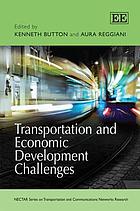 Transportation and Economic Development Challenges
by
Recent years have seen considerable changes in the technology of transportation with the development of high-speed rail networks, more fuel-efficient automobiles and aircraft, and the widespread adoption of informatics in disciplines such as traffic manag
Transportation and Economic Development Challenges
by
Recent years have seen considerable changes in the technology of transportation with the development of high-speed rail networks, more fuel-efficient automobiles and aircraft, and the widespread adoption of informatics in disciplines such as traffic manag
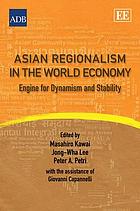 Asian Regionalism in the World Economy: engine for dynamism and stability
by
The structure and policy architecture of the world economy, as it emerges from the historic challenges now underway, will be affected by the dramatic rise of Asian economies and deepening connections among them. This important book examines the rapid tran
Asian Regionalism in the World Economy: engine for dynamism and stability
by
The structure and policy architecture of the world economy, as it emerges from the historic challenges now underway, will be affected by the dramatic rise of Asian economies and deepening connections among them. This important book examines the rapid tran
 Globalization and economic development : essays in Honour of J. George Waardenburg
by
Globalization and economic development : essays in Honour of J. George Waardenburg
by
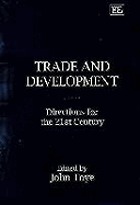 Trade and Development : directions for the 21st century
by
This book questions what enduring lessons have been learnt about the interdependence of international trade and economic development during the last 50 years. Since the end of the Cold War and the advent of the WTO, developing countries have been forced t
Trade and Development : directions for the 21st century
by
This book questions what enduring lessons have been learnt about the interdependence of international trade and economic development during the last 50 years. Since the end of the Cold War and the advent of the WTO, developing countries have been forced t
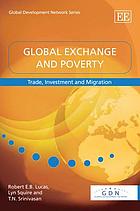 Global Exchange and Poverty: trade, investment and migration
by
This book examines how policies implemented by members of the Organisation for Economic Co-operation and Development (OECD) affect development and poverty in developing and transition economies.
Global Exchange and Poverty: trade, investment and migration
by
This book examines how policies implemented by members of the Organisation for Economic Co-operation and Development (OECD) affect development and poverty in developing and transition economies.
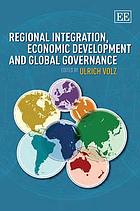 Regional Integration, Economic Development and Global Governance
by
The contributors expertly provide a comparative perspective on regional integration in different regions of the world while at the same time analysing the various facets of integration, relating to trade, FDI, finance and monetary policies. They provide a
Regional Integration, Economic Development and Global Governance
by
The contributors expertly provide a comparative perspective on regional integration in different regions of the world while at the same time analysing the various facets of integration, relating to trade, FDI, finance and monetary policies. They provide a
 Changing Big Business: the globalisation of the fair trade movement
by
Drawing on candid accounts from practitioners, producers and industry representatives, this informative and proactive volume investigates the challenges facing todayÕs fair trade movement and provides unique insights into the workings of social and econom
Changing Big Business: the globalisation of the fair trade movement
by
Drawing on candid accounts from practitioners, producers and industry representatives, this informative and proactive volume investigates the challenges facing todayÕs fair trade movement and provides unique insights into the workings of social and econom
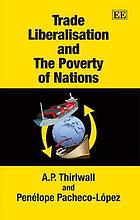 Trade Liberalisation and the Poverty of Nations
by
This book argues that orthodox theory is based on many unreal assumptions, and that there are sound economic arguments for selective protection of industrial activities in the early stages of economic development. The historical evidence of the now-develo
Trade Liberalisation and the Poverty of Nations
by
This book argues that orthodox theory is based on many unreal assumptions, and that there are sound economic arguments for selective protection of industrial activities in the early stages of economic development. The historical evidence of the now-develo
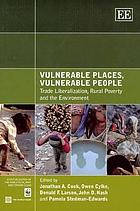 Vulnerable Places, Vulnerable People
by
While some argue that trade liberalization has raised incomes and led to environmental protection in developing countries, others claim that it generates neither poverty reduction nor sustainability. The detailed case studies in this book demonstrate that
Vulnerable Places, Vulnerable People
by
While some argue that trade liberalization has raised incomes and led to environmental protection in developing countries, others claim that it generates neither poverty reduction nor sustainability. The detailed case studies in this book demonstrate that
 Developing Countries in the World Trading System: the Uruguay round and beyond
by
The book examines the achievements of the Uruguay Round of trade negotiations in reforming the world trading system and the challenges to future reforms. It begins with an overview of the genesis of the world trading system and moves on to examine the key
Developing Countries in the World Trading System: the Uruguay round and beyond
by
The book examines the achievements of the Uruguay Round of trade negotiations in reforming the world trading system and the challenges to future reforms. It begins with an overview of the genesis of the world trading system and moves on to examine the key
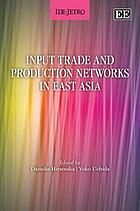 Input Trade and Production Networks in East Asia
by
Intermediate input trade is regarded as an important contributory factor in explaining the increase in world trade in recent years. This timely book presents, for the first time, meticulous empirical analyses of the growth of input trade, and includes det
Input Trade and Production Networks in East Asia
by
Intermediate input trade is regarded as an important contributory factor in explaining the increase in world trade in recent years. This timely book presents, for the first time, meticulous empirical analyses of the growth of input trade, and includes det
 Value Proposition Design: how to create products and services customers want
by
The authors of the international bestseller Business Model Generation explain how to create value propositions customers can't resist Value Proposition Design helps you tackle the core challenge of every business -- creating compelling products and services customers want to buy. This highly practical book, paired with its online companion, will teach you the processes and tools you need to create products that sell. Using the same stunning visual format as the authors' global bestseller, Business Model Generation, this sequel explains how to use the "Value Proposition Canvas" to design, test, create, and manage products and services customers actually want. Value Proposition Design is for anyone who has been frustrated by new product meetings based on hunches and intuitions; it's for anyone who has watched an expensive new product launch fail in the market. The book will help you understand the patterns of great value propositions, get closer to customers, and avoid wasting time with ideas that won't work. You'll learn the simple process of designing and testing value propositions, that perfectly match customers' needs and desires. In addition the book gives you exclusive access to an online companion on Strategyzer.com. You will be able to assess your work, learn from peers, and download pdfs, checklists, and more. Value Proposition Design is an essential companion to the "Business Model Canvas" from Business Model Generation, a tool embraced globally by startups and large corporations such as MasterCard, 3M, Coca Cola, GE, Fujitsu, LEGO, Colgate-Palmolive, and many more. Value Proposition Design gives you a proven methodology for success, with value propositions that sell, embedded in profitable business models."
Value Proposition Design: how to create products and services customers want
by
The authors of the international bestseller Business Model Generation explain how to create value propositions customers can't resist Value Proposition Design helps you tackle the core challenge of every business -- creating compelling products and services customers want to buy. This highly practical book, paired with its online companion, will teach you the processes and tools you need to create products that sell. Using the same stunning visual format as the authors' global bestseller, Business Model Generation, this sequel explains how to use the "Value Proposition Canvas" to design, test, create, and manage products and services customers actually want. Value Proposition Design is for anyone who has been frustrated by new product meetings based on hunches and intuitions; it's for anyone who has watched an expensive new product launch fail in the market. The book will help you understand the patterns of great value propositions, get closer to customers, and avoid wasting time with ideas that won't work. You'll learn the simple process of designing and testing value propositions, that perfectly match customers' needs and desires. In addition the book gives you exclusive access to an online companion on Strategyzer.com. You will be able to assess your work, learn from peers, and download pdfs, checklists, and more. Value Proposition Design is an essential companion to the "Business Model Canvas" from Business Model Generation, a tool embraced globally by startups and large corporations such as MasterCard, 3M, Coca Cola, GE, Fujitsu, LEGO, Colgate-Palmolive, and many more. Value Proposition Design gives you a proven methodology for success, with value propositions that sell, embedded in profitable business models."
 MicroFranchising: creating wealth at the bottom of the pyramid
by
This unique book provides an overview of the need to alleviate poverty and what methods have been used in the past to do so (e.g. microcredit). It then introduces the concept of the microfranchise and discusses how this business model can be used in pover
MicroFranchising: creating wealth at the bottom of the pyramid
by
This unique book provides an overview of the need to alleviate poverty and what methods have been used in the past to do so (e.g. microcredit). It then introduces the concept of the microfranchise and discusses how this business model can be used in pover
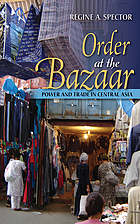 Order at the Bazaar : power and trade in Central Asia
by
Order at the Bazaar delves into the role of bazaars in the political economy and development of Central Asia. Bazaars are the economic bedrock for many throughout the region--they are the entrepreneurial hubs of Central Asia. However, they are often regarded as mafia-governed environments that are largely populated by the dispossessed. By immersing herself in the bazaars of Kyrgyzstan, Regine A. Spector learned that some are rather best characterized as islands of order in a chaotic national context. Spector draws on interviews, archival sources, and participant observation to show how traders, landowners, and municipal officials create order in the absence of a coherent government apparatus and bureaucratic state. Merchants have adapted Soviet institutions, including trade unions, and pre-Soviet practices, such as using village elders as the arbiters of disputes, to the urban bazaar by building and asserting their own authority. Spector's findings have relevance beyond the bazaars and borders of one small country; they teach us how economic development operates when the rule of law is weak.
Order at the Bazaar : power and trade in Central Asia
by
Order at the Bazaar delves into the role of bazaars in the political economy and development of Central Asia. Bazaars are the economic bedrock for many throughout the region--they are the entrepreneurial hubs of Central Asia. However, they are often regarded as mafia-governed environments that are largely populated by the dispossessed. By immersing herself in the bazaars of Kyrgyzstan, Regine A. Spector learned that some are rather best characterized as islands of order in a chaotic national context. Spector draws on interviews, archival sources, and participant observation to show how traders, landowners, and municipal officials create order in the absence of a coherent government apparatus and bureaucratic state. Merchants have adapted Soviet institutions, including trade unions, and pre-Soviet practices, such as using village elders as the arbiters of disputes, to the urban bazaar by building and asserting their own authority. Spector's findings have relevance beyond the bazaars and borders of one small country; they teach us how economic development operates when the rule of law is weak.
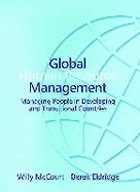 Global Human Resource Management: managing people in developing and transitional countries
by
This book presents Human Resource Management (HRM) as a tool for improving the performance of organizations in developing and transitional countries. It does this through the presentation of an integrated model of human resource management, informed by th
Global Human Resource Management: managing people in developing and transitional countries
by
This book presents Human Resource Management (HRM) as a tool for improving the performance of organizations in developing and transitional countries. It does this through the presentation of an integrated model of human resource management, informed by th
 Now, Discover Your Strengths
by
Now, Discover Your Strengths
by
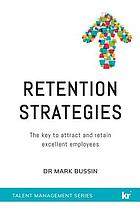 Retention strategies : the key to attracting and retaining excellent employees
by
Retention strategies : the key to attracting and retaining excellent employees
by
 Microfinance: emerging trends and challenges
by
This book takes a solid step toward a systematic analysis of the implications of microfinance for the role and regulation of capital markets. The authors address integration of capital markets with microfinance, technological innovations such as the use o
Microfinance: emerging trends and challenges
by
This book takes a solid step toward a systematic analysis of the implications of microfinance for the role and regulation of capital markets. The authors address integration of capital markets with microfinance, technological innovations such as the use o
 Financial Literacy for Millennials: a Practical Guide to Managing Your Financial Life for Teens, College Students, and Young Adults
by
A modern primer on consumer finance and personal money management intended for readers aged 15 to 30, this guide can also serve as a primary text for high school, college, or adult education courses on personal finance. There is growing awareness that teaching consumers more about finance is an urgent national priority--and that their education should begin early. Combining practical advice with targeted information on virtually every aspect of personal finance and money management, this book is the ideal resource for young people who want to start off their financial lives properly. The guide updates traditional personal finance topics, such as budgeting, credit, debt, savings, and investment, and goes beyond those fundamentals to furnish important life lessons on such concerns as career planning, starting a business, Internet fraud, and avoiding financial scams. It even provides useful background on the tax system, how to avoid bankruptcy, legal issues young adults often face, and the plethora of government benefits they can access. In fact, young readers will come away from this book with basic knowledge of every important area of personal finance. Ideal for teens and young adults, the volume will prove useful to parents who want to educate their children about the wise use of money, preparing them to make independent financial decisions. In addition, this book can be used to meet the standards enacted in every state for developing a curriculum guide for teaching financial literacy to high school students. It can also serve as a primary or supplementary resource in personal finance or consumer economics courses for college students and adults. Provides an understanding of the structure and institutions constituting the U.S. economic system Shares knowledge about consumer finance and financial planning to enable young people to make better choices in their lives Shows how to save and invest prudently and use debt wisely and effectively Prepares millennials for the financial impact of life events so they will be empowered to take control of their financial futures Includes a series of tips that summarize the important lessons from the book
Financial Literacy for Millennials: a Practical Guide to Managing Your Financial Life for Teens, College Students, and Young Adults
by
A modern primer on consumer finance and personal money management intended for readers aged 15 to 30, this guide can also serve as a primary text for high school, college, or adult education courses on personal finance. There is growing awareness that teaching consumers more about finance is an urgent national priority--and that their education should begin early. Combining practical advice with targeted information on virtually every aspect of personal finance and money management, this book is the ideal resource for young people who want to start off their financial lives properly. The guide updates traditional personal finance topics, such as budgeting, credit, debt, savings, and investment, and goes beyond those fundamentals to furnish important life lessons on such concerns as career planning, starting a business, Internet fraud, and avoiding financial scams. It even provides useful background on the tax system, how to avoid bankruptcy, legal issues young adults often face, and the plethora of government benefits they can access. In fact, young readers will come away from this book with basic knowledge of every important area of personal finance. Ideal for teens and young adults, the volume will prove useful to parents who want to educate their children about the wise use of money, preparing them to make independent financial decisions. In addition, this book can be used to meet the standards enacted in every state for developing a curriculum guide for teaching financial literacy to high school students. It can also serve as a primary or supplementary resource in personal finance or consumer economics courses for college students and adults. Provides an understanding of the structure and institutions constituting the U.S. economic system Shares knowledge about consumer finance and financial planning to enable young people to make better choices in their lives Shows how to save and invest prudently and use debt wisely and effectively Prepares millennials for the financial impact of life events so they will be empowered to take control of their financial futures Includes a series of tips that summarize the important lessons from the book
 Beyond Inflation Targeting: assessing the impacts and policy alternatives
by
This book, written by an international team of economists, develops concrete, country specific alternatives to inflation targeting, the dominant policy framework of central bank policy that focuses on keeping inflation in the low single digits to the virt
Beyond Inflation Targeting: assessing the impacts and policy alternatives
by
This book, written by an international team of economists, develops concrete, country specific alternatives to inflation targeting, the dominant policy framework of central bank policy that focuses on keeping inflation in the low single digits to the virt
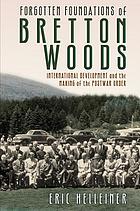 Forgotten Foundations of Bretton Woods
by
Eric Helleiner's new book provides a powerful corrective to conventional accounts of the negotiations at Bretton Woods, New Hampshire, in 1944. These negotiations resulted in the creation of the International Monetary Fund and the World Bank--the key international financial institutions of the postwar global economic order. Critics of Bretton Woods have argued that its architects devoted little attention to international development issues or the concerns of poorer countries. On the basis of extensive historical research and access to new archival sources, Helleiner challenges these assumptions, providing a major reinterpretation that will interest all those concerned with the politics and history of the global economy, North-South relations, and international development.The Bretton Woods architects--who included many officials and analysts from poorer regions of the world--discussed innovative proposals that anticipated more contemporary debates about how to reconcile the existing liberal global economic order with the development aspirations of emerging powers such as India, China, and Brazil. Alongside the much-studied Anglo-American relationship was an overlooked but pioneering North-South dialogue. Helleiner's unconventional history brings to light not only these forgotten foundations of the Bretton Woods system but also their subsequent neglect after World War II.
Forgotten Foundations of Bretton Woods
by
Eric Helleiner's new book provides a powerful corrective to conventional accounts of the negotiations at Bretton Woods, New Hampshire, in 1944. These negotiations resulted in the creation of the International Monetary Fund and the World Bank--the key international financial institutions of the postwar global economic order. Critics of Bretton Woods have argued that its architects devoted little attention to international development issues or the concerns of poorer countries. On the basis of extensive historical research and access to new archival sources, Helleiner challenges these assumptions, providing a major reinterpretation that will interest all those concerned with the politics and history of the global economy, North-South relations, and international development.The Bretton Woods architects--who included many officials and analysts from poorer regions of the world--discussed innovative proposals that anticipated more contemporary debates about how to reconcile the existing liberal global economic order with the development aspirations of emerging powers such as India, China, and Brazil. Alongside the much-studied Anglo-American relationship was an overlooked but pioneering North-South dialogue. Helleiner's unconventional history brings to light not only these forgotten foundations of the Bretton Woods system but also their subsequent neglect after World War II.
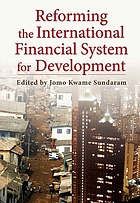 Reforming the International Financial System for Development
by
The 1944 Bretton Woods conference created new institutions for international economic governance. Though flawed, the system led to a golden age in postwar reconstruction, sustained economic growth, job creation, and postcolonial development. Yet financial liberalization since the 1970s has involved deregulation and globalization, which have exacerbated instability, rather than sustained growth. In addition, the failure of Bretton Woods to provide a reserve currency enabled the dollar to fill the void, which has contributed to periodic, massive U.S. trade deficits. Our latest global financial crisis, in which all these weaknesses played a part, underscores how urgently we must reform the international financial system. Prepared for the G24 research program, a consortium of developing countries focused on financial issues, this volume argues that such reforms must be developmental. Chapters review historical trends in global liquidity, financial flows to emerging markets, and the food crisis, identifying the systemic flaws that contributed to the recent downturn. They challenge the effectiveness of recent policy and suggest criteria for regulatory reform, keeping in mind the different circumstances, capacities, and capabilities of various economies. Essays follow ongoing revisions in international banking standards, the improved management of international capital flows, the critical role of the World Trade Organization in liberalizing and globalizing financial services, and the need for international tax cooperation. They also propose new global banking and reserve currency arrangements.
Reforming the International Financial System for Development
by
The 1944 Bretton Woods conference created new institutions for international economic governance. Though flawed, the system led to a golden age in postwar reconstruction, sustained economic growth, job creation, and postcolonial development. Yet financial liberalization since the 1970s has involved deregulation and globalization, which have exacerbated instability, rather than sustained growth. In addition, the failure of Bretton Woods to provide a reserve currency enabled the dollar to fill the void, which has contributed to periodic, massive U.S. trade deficits. Our latest global financial crisis, in which all these weaknesses played a part, underscores how urgently we must reform the international financial system. Prepared for the G24 research program, a consortium of developing countries focused on financial issues, this volume argues that such reforms must be developmental. Chapters review historical trends in global liquidity, financial flows to emerging markets, and the food crisis, identifying the systemic flaws that contributed to the recent downturn. They challenge the effectiveness of recent policy and suggest criteria for regulatory reform, keeping in mind the different circumstances, capacities, and capabilities of various economies. Essays follow ongoing revisions in international banking standards, the improved management of international capital flows, the critical role of the World Trade Organization in liberalizing and globalizing financial services, and the need for international tax cooperation. They also propose new global banking and reserve currency arrangements.
 Managing Capital Flows: the search for a framework
by
Managing Capital Flows provides analyses designed to help policymakers develop a framework for managing capital flows that is consistent with prudent macroeconomic and financial sector stability.
Managing Capital Flows: the search for a framework
by
Managing Capital Flows provides analyses designed to help policymakers develop a framework for managing capital flows that is consistent with prudent macroeconomic and financial sector stability.
 Raise Capital on Your Own Terms
by
Fund and Fuel Your Dreams! You're an entrepreneur with a great idea. But your business needs money. So, do you max out your credit cards, borrow from friends and family, and do everything yourself? Or do you make a devil's bargain with some venture capitalist who'll demand a tenfold return and could easily take your business out from under you? No and no! You don't have to bootstrap, and you don't have to sell out! Jenny Kassan says the landscape of investment capital is far larger and more diverse than most people realize. She illuminates the vast range of capital-raising strategies available to mission-driven entrepreneurs and provides a six-step process for finding and enlisting investors who are a match with your personal goals and aspirations. The plan you create will inspire you, excite you, and help you achieve your dreams!
Raise Capital on Your Own Terms
by
Fund and Fuel Your Dreams! You're an entrepreneur with a great idea. But your business needs money. So, do you max out your credit cards, borrow from friends and family, and do everything yourself? Or do you make a devil's bargain with some venture capitalist who'll demand a tenfold return and could easily take your business out from under you? No and no! You don't have to bootstrap, and you don't have to sell out! Jenny Kassan says the landscape of investment capital is far larger and more diverse than most people realize. She illuminates the vast range of capital-raising strategies available to mission-driven entrepreneurs and provides a six-step process for finding and enlisting investors who are a match with your personal goals and aspirations. The plan you create will inspire you, excite you, and help you achieve your dreams!
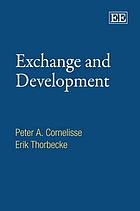 Exchange and Development
by
This innovative and important book develops a new framework for analysing exchange that takes place within and outside markets over the course of development.
Exchange and Development
by
This innovative and important book develops a new framework for analysing exchange that takes place within and outside markets over the course of development.
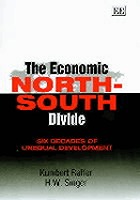 The Economic North-South Divide: six decades of unequal development
by
The Economic NorthÐSouth Divide explores the structural roots of the debt crisis and considers the impact of debt management on NorthÐSouth economic relations, exposing certain double standards that tilt global markets further against the South. Encourage
The Economic North-South Divide: six decades of unequal development
by
The Economic NorthÐSouth Divide explores the structural roots of the debt crisis and considers the impact of debt management on NorthÐSouth economic relations, exposing certain double standards that tilt global markets further against the South. Encourage